Advertisement
Supported by

Questions for Investigators Trying to Unravel Mystery of Luxury Yacht’s Sinking
The investigators searching for answers about the shipwreck, leaving seven dead, face questions about extreme weather and possible human error or problems with the yacht itself.
- Share full article

By Alan Yuhas
More than 180 feet long, with a mast towering about 240 feet and a keel that could be lowered for greater stability, the Bayesian luxury yacht did not, in the eyes of its maker, have the vulnerabilities of a ship that would easily sink.
“It drives me insane,” Giovanni Costantino, the chief executive of the Italian Sea Group, which in 2022 bought the company that made the ship, said after its wreck last week. “Following all the proper procedures, that boat is unsinkable.”
But the $40 million sailing yacht sank within minutes and with fatal results: seven dead, including the British technology billionaire Michael Lynch, his teenage daughter, four of Mr. Lynch’s friends and a member of the crew. Fifteen people, including the captain, escaped on a lifeboat.
Mr. Lynch had invited family, friends and part of his legal team on a cruise in the Mediterranean to celebrate his acquittal in June of fraud charges tied to the sale of his company to the tech giant Hewlett-Packard.
The Italian authorities have opened a manslaughter investigation, searching for answers from the survivors, the manufacturer and the wreck itself. They face a range of questions and possible factors.
An ‘earthquake’ in the sky?
When the Bayesian sank around 4 a.m. on Aug. 19, the waters in its area, about half a mile off the Sicilian port of Porticello, were transformed by an extremely sudden and violent storm, according to fishermen, a captain in the area and meteorologists.
But what kind of storm is still a mystery, compounded by the fact that a sailing schooner anchored nearby did not have its own disaster. Also unclear is whether the crew was aware that the Italian authorities had issued general warnings about bad weather the night before.
Karsten Börner, the captain of the nearby passenger ship, said he’d had to steady his ship during “really violent” winds . During the storm, he said, the Bayesian seemed to disappear behind his ship.
Severe lightning and strong gusts were registered by the Italian Air Force’s Center for Aerospace Meteorology and Climatology, according to Attilio Di Diodato, its director. “It was very intense and brief in duration,” he said.
The yacht, he said, had most likely been hit by a fierce downburst — a blast of powerful wind surging down during a thunderstorm. His agency put out rough-sea warnings the previous evening, alerting sailors about possible storms.
Locals have said the winds “felt like an earthquake.” A fisherman in Porticello said that he had seen a flare go off in the early-morning hours. His brother ventured to the site once the weather had calmed about 20 minutes later, he said, finding only floating cushions.
The Italian authorities have so far declined to say whether investigators had seen any structural damage to the hull or other parts of the ship.
Open hatches or doors?
The boat executive, Mr. Costantino, has argued that the Bayesian was an extremely safe vessel that could list even to 75 degrees without capsizing. His company, the Italian Sea Group, in 2022 bought the yacht’s manufacturer, Perini Navi, which launched the ship in 2008.
Mr. Costantino said that if some of the hatches on the side and in the stern, or some of the deck doors, had been open, the boat could have taken on water and sunk. Standard procedure in such storms, he said, would be to switch on the engine, lift the anchor and turn the boat into the wind, lowering the keel for extra stability, closing doors and gathering the guests in the main hall inside the deck.
At a news conference on Saturday, almost a week after the sinking, investigators said the yacht had sunk at an angle , with its stern — where the heavy engine was — having gone down first. The wreck was found lying on its right side at the bottom of a bay, about 165 feet deep.

12 guests occupied the yacht’s six cabins. There were also 10 crew members.
Open hatches, doors and cabin windows could have let in water during a storm, according to the manufacturer.

Open hatches, doors and
cabin windows could
have let in water
during a storm,
according to the
manufacturer.
Source: Superyacht Times, YachtCharterFleet, MarineTraffic
By Veronica Penney
Water pouring into open hatches or doors could have contributed to the sinking, experts say, but that on its own may not account for the speed at which such a large boat vanished underwater.
Asked about the hatches at the news conference, the authorities declined to comment on whether they had been found open at the wreck.
The authorities have also not specified whether the boat had been anchored, whether it was under power at the time or whether its sails had been unfurled.
A retracted keel?
The Bayesian had a keel — the fin-like structure beneath a boat that can help stabilize it — that could be retracted or extended, according to its manufacturer. On some yachts, keels can be raised to let the large vessel dock in shallower water, and extended downward to help keep a boat level.
But like the hatches, the status of the keel alone may not explain why a large ship sank with such precipitous speed. Investigators have not disclosed what divers may have seen at the wreck, aside from saying divers had faced obstacles like furnishings and electrical wiring in tight quarters. Officials want to raise the wreck to better examine it, a process that may take weeks.
Human error?
Ambrogio Cartosio, the prosecutor in charge of the case, said at the news conference that it was “plausible” crimes had been committed, but that investigators had not zeroed in on any potential suspects.
“There could be responsibilities of the captain only,” he said. “There could be responsibilities of the whole crew. There could be responsibilities of the boat makers. Or there could be responsibilities of those who were in charge of surveilling the boat.”
It remains unclear what kind of emergency training or preparation took place before the disaster, or what kind of coordination there was during it. So far, none of the surviving crew members have made a public statement about what happened the night the ship sank.
Prosecutors said they want to ask more questions of the captain and crew, who have been in a Sicilian hotel with other survivors. They said that neither alcohol nor drug tests had been performed on crew members, and that they have been allowed to leave Italy.
Prosecutors also said they were also investigating why the captain, an experienced sailor, left the sinking boat while some passengers were still on board.
Besides possible manslaughter charges, the authorities are investigating the possibility of a negligently caused shipwreck.
The bodies of five passengers were found in one cabin, on the left side of the yacht, the authorities said. The five were most likely trying to flee to the higher side of the boat and were probably sleeping when the boat started to sink, they said.
Watch CBS News
Captain, 2 crew members from Mike Lynch's family yacht reportedly under investigation over sinking off Italy
By Anna Matranga
Updated on: August 28, 2024 / 10:47 AM EDT / CBS News
Rome — The engineer and a sailor from the crew of the luxury superyacht that sank off the coast of Sicily , killing British tech entrepreneur Mike Lynch and his 18-year-old daughter along with five other people, have been placed under investigation by Italian prosecutors along with the captain of the vessel, according to the Reuters and ANSA news agencies. CBS News could not immediately reach the prosecutors or lawyers for the Bayesian yacht's crew members to confirm the development, which comes about a week and a half after the vessel capsized on Aug. 19.
Engineer Tim Parker Eaton and sailor Matthew Griffiths, who was on night watch duty when the incident occurred, were reportedly placed under formal investigation for possible manslaughter and culpable shipwreck a few days after the 184-foot Bayesian yacht's captain, James Cutler, whose lawyers have confirmed that he's a subject of the probe.
After meeting with prosecutors for several days, Cutler, a 51-year-old New Zealander, has declined to answer any further questions, his lawyer said Wednesday.
"The captain exercised his right to remain silent for two fundamental reasons," attorney Giovanni Rizzuti told reporters. "First, he's very worn out. Second, we were appointed only on Monday and for a thorough and correct defense case, we need to acquire a set of data that at the moment we don't have."

Lynch and his daughter Hannah, 18, were among the passengers and one crew members who died when the superyacht sank rapidly during a violent storm in the pre-dawn hours of Aug. 19. The capsize of the high-tech vessel quickly raised questions, as another sailboat that had been anchored nearby off the coast of Palermo made it through the storm unscathed.
Fifteen people, including Lynch's wife Angela Bacares, escaped to a life raft and were rescued by another boat that had been in the vicinity.
According to reports by Italian media, investigators are looking into whether the engineer, Eaton, might have neglected to activate security systems designed to automatically close all the hatches on the vessel, leaving the engine room to flood and possibly causing a power outage and the subsequent rapid flooding of the entire yacht.
Under Italian law, being placed under investigation does not necessarily mean formal charges will follow.
During a press conference on Saturday, prosecutors said the investigation would require the wreck of the Bayesian to be salvaged from the seabed, where it currently sits at a depth of about 160 feet.
Chief prosecutor Ambrogio Cartosio said his team would work to determine whether the captain, other crew members, or the yacht's manufacturers bear any responsibility for the sinking.
- Boat Accident
More from CBS News

Italian grandma prays, drinks puddles to survive 4 nights lost in woods

Details emerge after Viking ship replica sinks, killing U.S. woman

2 injured as sinkhole opens, swallowing SUV on road in central Seoul

Most of wolf pack caught after 7 children, 1 woman killed in India
Italy opens investigation into captain in deadly yacht sinking, lawyer says
James Cutfield, a veteran sailor from New Zealand, is being investigated after the Bayesian capsized, killing seven, including tech figure Mike Lynch.
Italian prosecutors are investigating James Cutfield, the captain of a superyacht that sank off the coast of Sicily last week in a storm , according to a lawyer representing him.
The sinking killed seven of the 22 people aboard, including British tech entrepreneur Mike Lynch .
Aldo Mordiglia, Cutfield’s attorney, said by email that the captain is under investigation for potential manslaughter charges and will be interviewed by public prosecutors later Tuesday.
Italian media reports have also said the 51-year-old New Zealander will be questioned by prosecutors as part of a probe into how the ship sank within minutes of being hit by a storm on Aug. 19 and whether any errors were made.
Cutfield is “very affected” by the whole affair, another of his lawyers, Giovanni Rizzuti, told Italian media , and plans to defend himself against any charges.
News that the focus of the investigation has turned to Cutfield was first reported by the La Repubblica newspaper. Italian prosecutors said Saturday that they had opened an investigation into possible culpable shipwreck and manslaughter, but no suspects were named at the time.
Registering suspects is a requirement before autopsies can be carried out on the victims, Italian news agency ANSA reported .
In Italy, being placed under investigation doesn’t mean charges will follow. Under maritime law, a captain is responsible for the ship, its crew and any passengers.
Other crew members were interviewed Monday.
The British-flagged Bayesian capsized after being caught in what authorities called a “violent storm” in the early hours of Aug. 19. The 183-foot yacht sank to a depth of more than 160 feet. The bodies of Lynch and five other victims, including his 18-year-old daughter, Hannah, were found days later inside the yacht. The body of the yacht’s chef, Recaldo Thomas, was recovered during initial search efforts.
Italian investigators are trying to piece together what happened. A law enforcement official, speaking to The Washington Post on the condition of anonymity because he was not authorized to talk about the ongoing investigation, said authorities are eager to examine the side of the submerged wreckage that is not visible.
“We’ll need to wait until the wreck is pulled out of water,” the official said.
The questions on investigators’ minds, the official added, range from whether the hatches had not been battened down — something that experts say could explain how seawater flooded the vessel so quickly — to whether “every crew member onboard did what they were supposed to.”
The official said that with the exception of the yacht’s chef, “the entire crew was already on the lifeboat,” while the six guests who died were still inside the yacht. Asked whether an alarm was ever sounded, the official replied: “How were those [guests] still in their rooms?”
In an analysis issued Tuesday, Italy’s National Research Council examined the possibility that a downdraft — a rapidly descending flow of air typically associated with violent storms — may have put the Bayesian in distress. It cited a 2008 example off the coast of Venice, where, within a few minutes, wind speed increased 10-fold, with some gusts above the capability of instruments to measure. Waves also increased in size, rapidly going from 11 inches to almost 10 feet.
Other boats in the area during last week’s storm were unscathed, leading the yacht’s designers to speculate that a hatch could have been left open, allowing water to enter.
“The Bayesian was built to go to sea in any weather,” Franco Romani, one of the Bayesian’s architects, told the La Stampa newspaper Monday.
Cutfield’s brother, Mark Cutfield, told the New Zealand Herald last week that his brother is “a very good sailor” who has spent much of his life working on boats in the Mediterranean after sailing competitively in his youth.


Skipper on a Yacht – The Ultimate Guide
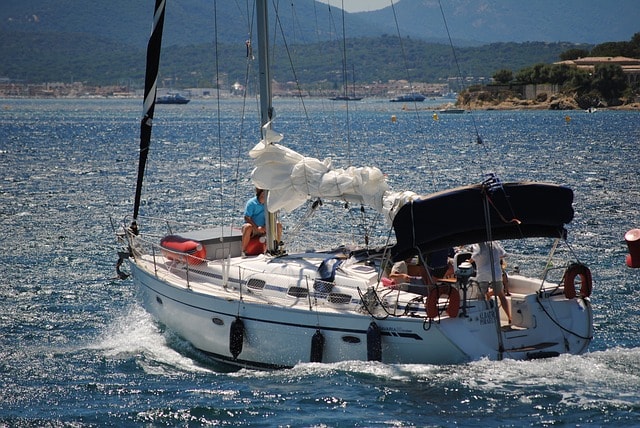
When it comes to sailing trips and holidays, a lot of people appear misinformed that it requires extensive knowledge of oceanic navigation as well as operating a boat.
The comforting truth, on the contrary, is that a sailing trip can be enjoyed by complete novices as much as any sailing pro.
Almost all yacht charter companies these days provide a skippered boat with a crew in addition to regular bareboat charters.
In other words, you can enjoy the freedom of being all by yourself in the serene blue ocean without any stress and responsibility.
In fact, in my early experiences on charter boats, I almost always had professional and experienced skippers in charge of navigation and operation. Even now, I often go on sailing holidays with a skipper on a yacht.
In this article, you can learn all about the benefits of hiring a skippered boat, tips to hire a professional and experienced captain, what you can legitimately expect from the skipper during your sailing trip as well as other relevant information.
Table of Contents
Responsibilities of the Skipper
The primary reason for chartering a skippered boat is to hand over the navigation and operation of the yacht to someone who has the necessary experience and knowledge.
In the case of your skipper, you can expect him to ensure the safe passage of the boat through responsible boat handling and safe seamanship.
In the case of a fully crewed yacht, the responsibilities of the skipper include making sure the crew understand and carry out their roles and duties.
The skipper is expected to maintain proper coordination among the crew.
To sum up, the tasks and responsibilities of a skipper are both technical and interpersonal. Apart from operating the boat and navigating it expertly, he should also ensure that the crew is obeying his command dutifully.
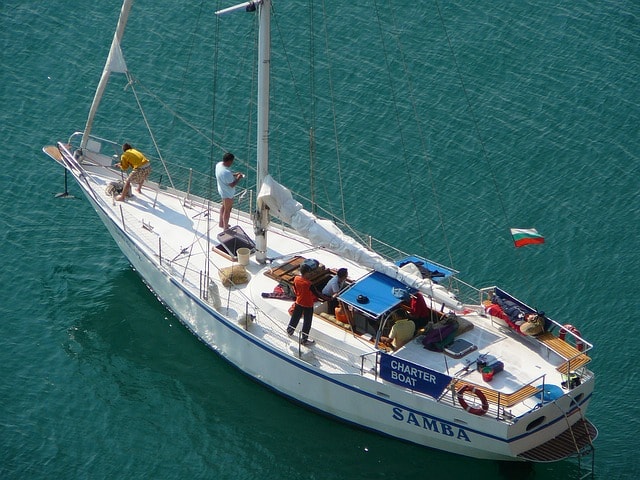
Who Should Choose the Option of a Skippered Yacht?
People with no or little sailing experience would have to choose the services of a professional and experienced skipper to make their trip a success.
Skippered yachts are perfect for those who do not possess a sailor’s license but want to partake in the fun of a sailing holiday.
Also, if you are part of a large group of friends and family, and want to leave the responsibility of sailing to the skipper to enjoy the trip in a stress-free manner, then you should certainly consider a skippered boat.
A skippered boat is also ideal for people who want to sharpen their sailing skill under the watchful eye of an experienced and professional sailor.
Even experienced sailors can benefit from professionally skippered boats if you want to partake in regattas and require that extra bit of help and professional knowledge.
Planning Your Itinerary With the Skipper
One of the best advantages of having a skippered boat comes from the help you would get in planning your sailing itinerary.
The skippers on particular routes have extensive knowledge of the best locations, coves, inlets, and beaches that you and your friends would enjoy during the trip.
They can help you plan the sailing trip in a way that makes it possible for you to see and experience the most during your trip.
Also, skippers are intimately aware of the prevailing weather conditions and may help you tweak your itinerary in such a way that adverse weather does not mar your holiday.
Last, but not the least, skippers know the best and cheapest places to moor the boat so that you do not spend extra at expensive marinas.
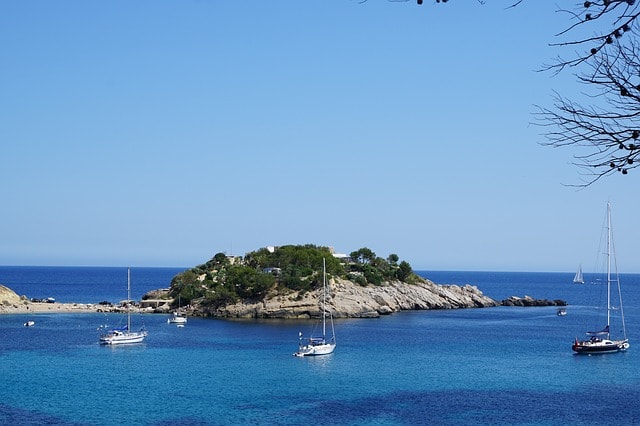
Does the Yacht Charter Price Include in Skipper’s Fees?
Yacht charter companies do not include the fees payable to a skipper when you lease their boats.
The fees commanded by the skipper is typically done at the base office, while the invoice for the same is generated and handed over to you after the completion of the trip.
The yacht charter companies only advertise the cost of hiring their boat, without the crew, complements, and skipper, on their brochures and websites.
Accommodation for Skipper Aboard the Boat
It is required that you reserve one of the cabins for skipper and his crew to rest and sleep in during your sailing trip.
Typically, a lot of boats have a special version for charter companies featuring extra cabins so that more people can be accommodated on the boat.
It is not required that you reserve the stateroom or other luxurious cabins for the crew. Typically, yachts come with a dedicated cabin for crew and feature bunk beds.
Who is Responsible for Skipper’s Meals?
It is customary that skippers be provided meals along with the crew by the chartering party. There is no requirement that the food should be fancy or gourmet quality, and the crew and skipper would typically eat whatever you serve.
During your trip ashore in the middle of your sailing holiday, it is considered nice to take the skipper to restaurants along with you.
However, there is no such requirement or custom, and you may just hand him enough cash for a meal at the local fast food joint.
Do’s and Don’ts for Skipper on Board the Yacht
As mentioned above, the primary role of the skipper on board the boat is to ensure a safe and enjoyable trip for everyone.
This means taking care of the technical aspects of sailing, including the correct deployment of mast and sails, safe moorings, checking the weather conditions, guiding the crew, and advise on the route.
The skipper, however, is not obligated to take the route preferred by you if they deem it dangerous due to any reason, including weather.
Similarly, you should not expect the skipper to perform menial tasks such as cleaning.
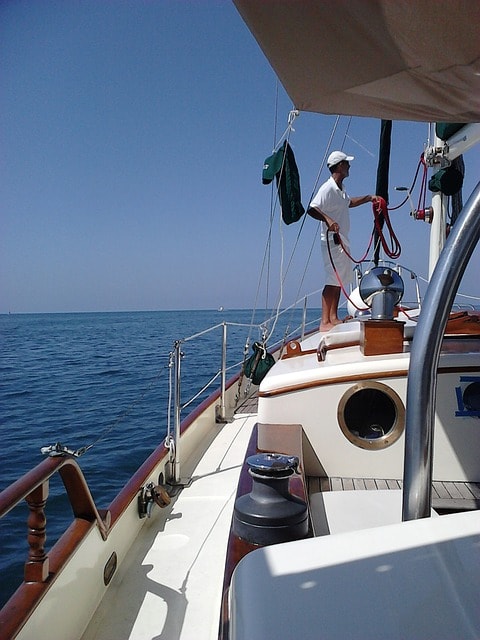
Cost of Hiring a Skipper
The cost of hiring a skipper dependent on some factors including his professional experience, the region you are sailing in, and the sailing season.
On an average, you should expect to pay between Euro 90 to 150 for each day of your sailing trip.
How to Tip the Skipper?
It is customary to tip the skipper at the end of the sailing trip. Typically, the tip works out to 10 percent of his total sailing fee.
However, if you liked his services and recommendations, then you may tip generously. The skipper will certainly appreciate it.
Advantages of Hiring a Skipper
Probably the best part of having a skippered boat is that it allows you to get the most out of your sailing holiday.
- In my personal experience, I have noticed that the presence of a professional and experienced skipper enabled us to plan our itinerary better.
- Many times, the skipper’s intimate knowledge of the local coastline and weather helped us see places that we did not expect and avoid rough weather.
- Skippers know the best places to eat during your trips ashore and have their own local sources to recommend the best places to see and visit.
- Also, you can truly enjoy a stress-free and blissful holiday with your friends and family safe in the knowledge that your boat is in capable hands.
In Conclusion
Skippered boats are probably a perfect way to introduce the joy of sailing holidays to those who have not experienced it before.
Even among those with sufficient sailing experience, there are a lot of benefits to having an experienced skipper in charge of the yacht.
There is no doubt that an experienced sailor would help you get more out of your holiday in every sense of the term. While it may be slightly costlier than bareboat charters, a skippered boat is certainly worth its price.
Need a skipper on your boat? Send your inquiry now, and you’ll receive a free skippered yacht charter quote!
Want to Know More Tips?
Sign up to Cruising Sea newsletter to receive every two weeks the latest post straight to your inbox!
Have you already hired a skipper? If so, what was your experience? Please feel free to share it by leaving a comment just below, I’ll be glad to hear your feedback:)

Daniella has been passionate about travel, the sea, and nature for many years. As a child, she frequently traveled throughout the Mediterranean and continued with her journeys throughout her adult life.
Her experiences have created the desire within her to share her love for traveling with other passionate and adventurers who want to discover beautiful horizons and new cultures.
7 thoughts on “Skipper on a Yacht – The Ultimate Guide”
Hi Daniella,
I just found out that I can charter a yacht with a skipper commandeering it. I was reluctant to go to the sea because I thought I have to go to a “sea” school first.
Especially, when you watch all the Hollywood movies that portray you can go on a cruise without a skipper. And then comes the storm. YUCK!
Now I can safely plan my trip with the skipper’s help. Thank you for bringing this to my attention and corrected my misinformation.
No problem. it’s a pleasure for me to inform the readers, this is the purpose of the website:)
I am happy that the misinformation has been cleared up! And, indeed, you can plan in complete tranquility your next trip with the help of a skipper, believe me, it is worth it:)
Thank you for the comment and wish you a nice day!
Thanks for the information on skippers on a yacht. I have never been on a yacht before and know very little about them except what they look like and are used for! So i enjoyed learning about the skipper as never actually heard that term before. It’s something that i would love to do one day, And the pictures make it seem like it is an amazing experience to have. Maybe one day!
Having a skipper on board is something fabulous:) You don’t need to worry about the navigation at all. They also know the environment well so you can count on him to bring you to best places as well:) Isn’t great?
Thank you for the comment and wish you a wonderful day!
Thank you for visiting my website and for the comment:) To answer your question, most charter companies offer to the client the option to hire a skipper for their sailing holiday. Skippers are not included in the price as they work independently and the cost per day will vary between 120 to 150 Euro, some, even more, depending on the skipper skill. If you own a yacht and you wish to hire a skipper, you can find one at “ Delivery Captain ” I hope it helped and if you need more information, feel free to contact me at any time, I’ll be more than happy to assist!
Have a wonderful day!
I really like your comment about how an experienced sailor would help you get more out of a holiday than sailing on your own. I imagine it would also be a good idea to work with a skipper if you plan to buy your own yacht as well, even if you plan on learning to sail (someone has to teach you, after all). I imagine that a skipper would have a lot of good information about different services as well, like yacht delivery if you plan to move for example.
I am glad you like the comment, thank you for the kind feedback:) Oh, yes, definitely, a skipper will not just navigate the boat, but he will also teach you a lot of things and will bring you to places you don’t know. A skipper is someone you can rely on!
Thank you again for the comment and wish you a wonderful day!
Leave a Comment Cancel reply
By using this form you agree with the storage and handling of your data by this website. *

Welcome to theyachtskipper.com
Feel free to look around

Yacht skippering services in the Solent and beyond
Group charters, weekend sails, own boat tuition and yacht delivery
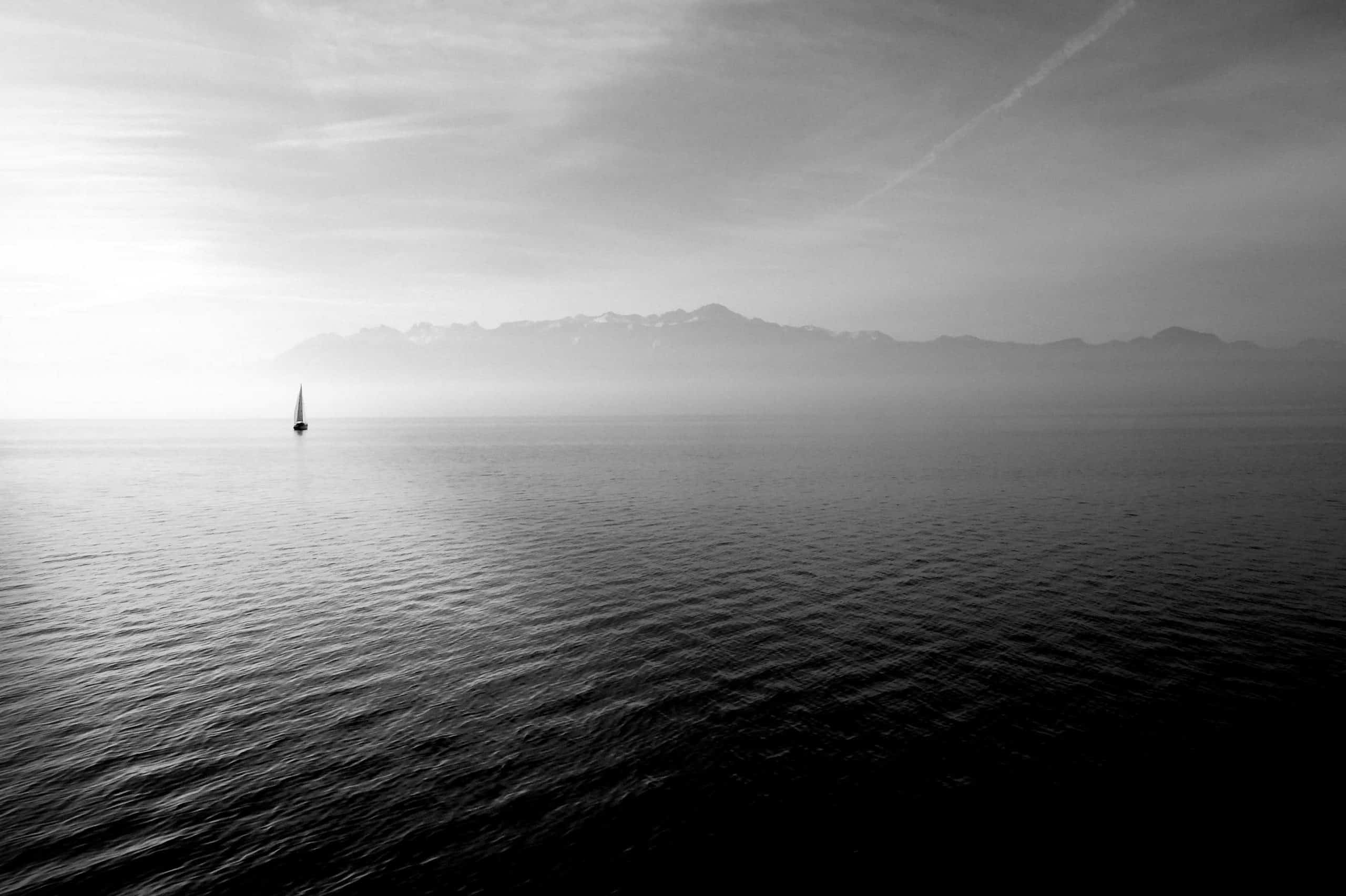
Ready to begin your journey?
Click the button below
Welcome to theyachtskipper.com – the home of Your Yacht Skipper. We are here to help you turn your sailing dreams into reality – through coaching, charter, delivery or yacht skipper placement. Have a look at our services and contact us to find out more.
Your Yacht Skipper can help you if
You are looking for a skipper or to organise a corporate yacht charter experience
You have a boat but lack the confidence in your skills to make the most of it, you want to have support during during the winter refit or are looking for project management for works on your yacht, you are considering yacht delivery as a means of moving your boat to your desired location, updates from facebook.
2 weeks ago

This content isn't available at the moment
Share on Facebook Share on Twitter Share on Linked In Share by Email
1 month ago
WhatsApp us
Yacht Charter with Skipper | 15 Things You Need to Know
Yacht charter with skipper | the 15 essentials, our guide to hiring a skipper for a yacht charter.
Embarking on booking a yacht charter adventure brings a world of excitement and questions, especially when it involves a skipper. Navigating the role and significance of a skipper is key to a successful journey. From understanding the definition of a skipper to grasping their responsibilities and qualifications, each element plays a crucial role in shaping your experience.
Cost and logistics are central to planning your charter. Delving into the details like skipper fees , route decisions , and crew hiring provides clarity and helps set realistic expectations. Additionally, practical concerns such as feeding the skipper and tipping etiquette are aspects often overlooked yet vital for a smooth sailing experience.
Finally, the more nuanced aspects of yacht chartering, like discussing plans with your skipper in advance and navigating the complexities of charter agreements , reveal the intricate dynamics of this unique travel experience. Dive into each of these facets to unravel the full picture of what it means to charter a yacht with a skipper.
Charter Payment Protection
Insolvency protection, safe payment, muti-currency. lossless forex, low price guarantee, exclusive deals no hidden fees, introduction to skippered yacht charters.
Understanding Skippered Charters. These charters are increasingly popular for their ease and expert guidance. Skippers are not only highly qualified mariners, but also adept at being sociable or discreet according to guest preferences.
You’ll also learn about some facts you might not have known, like it’s your responsibility to feed your skipper and your Operator or agent only act as “recruiters”, whilst they will bear natural responsibility for finding suitable and qualified skippers, it’s a typically a direct relationship.
Here at SailChecker, we work closely with our clients to help them make arrangements with their skipper that works for them.
Pre-Charter Access and Skipper Selection
Choosing Your Skipper. You get surprisingly little choice over or access to your skipper. Typically detailed planning discussions won’t be possibile until you arrive at the base.
Whilst this sounds restrictive, it’s actually the most effective and efficient. It will mean that your skipper is not dealing with future client’s and be able to focus on you during your charter. It means that you won’t make planning decisions that are undone by local weather conditions.
The popularity and freelance nature of skippers has lead to high demand and high turnover. Operators will not always be in a position to allocate until the week leading up to your charter.
Here at SailChecker we work hard to understand your specific requirements, not all operators work in the same way, help balance all your requirements to ensure the best possible experience.
Cost and Duration of Skippered Charters
How much does it Cost to Hire a Skipper? We’ll explore the typical costs and duration of skippered yacht charters, this segment provides crucial budgeting insights for those planning a charter.
SailChecker have independent options and their own skippers to give charterers a wider choice of crew.
Route Planning and Flexibility
Adjusting Sailing Routes: Skippers play a crucial role in route planning. However, pre-arrival planning is often subject to change due to local conditions. This flexibility ensures a comfortable and enjoyable journey, catering to real-time factors like weather and local events.
Role and Responsibilities of the Skipper
Expectations from Your Skipper. We’ll provide a detailed overview of the skipper’s responsibilities, emphasising their commitment to safety, navigation, and guest comfort, while clarifying limits in tasks like cooking and domestic duties.
Skippers are highly skilled professionals, it’s really important to understand what a Skipper will and won’t do for you.
Here at SailChecker, we use our independence to advise on different options and levels of service.
Understanding the Skipper Hiring Process
Selecting the Right Skipper: Insights into the hiring process of skippers, highlighting how charter operators ensure they select skippers who are not only skilled but also have the right interpersonal qualities.
Here at SailChecker, we know which Operators are recruiting and retaining the best Skippers in their freelance pool.
Interpersonal Skills of the Skipper
Skippers’ Social Skills: Concluding with the importance of a skipper’s ability to be genial, teach, entertain, and also maintain discretion, ensuring guests enjoy their time aboard while feeling comfortable with their presence.
Here at SailChecker, we know how important the right personality is, whether it’s someone who’s great with kids, someone who likes to teach the basics or someone who knows the party spots, we’ll help you refine your choice and create a better and more enjoyable sailing experience.
- 1. Definition of a Skipper?
- 2. How much does it cost to hire a Skipper?
3. Who decides the Route?
- 4. Can We Have the Skipper’s CV and Sailing Resume?
5. Can I Discuss our Plans with the Skipper in Advance?
6. is the route always certain on a skippered charter.
- 7. Who actually hires the Skipper?
- 8. What will the Skipper NOT DO on a yacht charter?
9. What will your Skipper ACTUALLY do on a yacht charter?
- 10. Who feeds a charter skipper?
- 11. How much Does a Skipper Earn on a Skippered Yacht charter?
- 12. How much do you tip your Skipper on a yacht charter?
- 13. Are Skipper’s Qualified?
- 14. How do you become a Skipper?
15. When Booking a Yacht Charter with a Skipper why can’t we have Open Access to them in Advance?
1. definition of a skipper, how to define the skipper or captain of a boat during a charter.
Let’s start with a formal definition:
Skipper. noun. /ˈskɪpə(r)/ /ˈskɪpər/ the captain of a small ship or fishing boat.
You will find the word used worldwide but it is chiefly in use in Europe, especially the UK. In the US and in the Far East, you will see the word interchanged with “captain”, reserved for larger ships in British English. Whichever you choose to use, you are highly unlikely to be misunderstood or even corrected.
In essence, it’s the most senior person on board and in command of the vessel and has some pretty serious obligations under the local laws and the International Regulations for the Prevention of Collision at Sea ( COLREGS ). He or she can, if in international waters, even officiate legally recognised weddings under some circumstances!
In the end, you have to lawfully accept their decisions whilst underway which makes understanding exactly what their responsibilities are when chartering with a skipper (or captain!).
2. How Much Does it Cost to Charter with a Skipper?
Freelance skipper rates for yacht charter.
Chartering with a Skipper. Now that you know you need or want to go chartering with a skipper, how much will it cost to hire one?
Price. In 2024 the most typical price for a chartering with a skipper was between €240 or $240 per day. Whilst advertising rates are per day, it can be difficult to charter for anything short of a week as most skippers are seeking full employment at peak times. The exception is Assisted Sailing .
Assisted Sailing. This is where a skipper joins you for several days at the commencement of your charter. It’s particularly useful if you are a little out of practice, a new sailor, or sailing a bigger boat than you are used to.
How Much Does It Cost to Charter a Yacht. We do recommend you check out our blog How Much Does It Cost to Charter a Yacht if you would like to piece the whole picture together.
Route Planning for a Yacht Charter
Many charterers are naturally anxious about knowing where they are going and who decides. For some, booking restaurants and other popular attractions along the way is essential.
The route selection is something that cannot ever be guaranteed. There is always a risk the weather plays a small or large part in your decision. Whilst the Skipper has the final say on safety, the primary guest will have a great deal of input into the route. Where there are restaurants that need booking, more than 1 week in advance, your operator will typically reach out to you, in the main, restaurants can be secured during your charter.
SailChecker has a great deal of experience in each location and, as importantly, how each base operates and treats guests. We aim to find what’s a priority for you and match you to the right operator and boat accordingly.
4. Can We Have the Skipper's CV and Sailing Resume
How much you get to learn about your skipper in advance and can vary and can change at short notice.
On high-end charters, known as Crewed Charters (opens in a new tab), the crew on the boat full-time have resumes and CVs that will be sent to you before booking. On skippered charters, where the boat and skipper are hired separately, skippers more typically come from a pool and for operational reasons, might only be allocated at short notice. This might not always be the case, smaller companies may allocate well in advance and changes are rare.
Planning With Your Crew in Advance is Often Restricted.
Being denied access to your Crew in advance is a common policy from Operators. This ensures that the crew focus entirely on you when you are on charter, and not dealing with communications from charters in the weeks ahead.
In some cases, your Operator may not know who your skipper is, or leave themselves the ability to move people around at the last minute. This is ‘priced-in’ when compared to Crewed Charters.
SailChecker will always honestly manage expectations about crew access. We are also a team of ex-crew members who can often answer many of the questions without needing to revert to the crew.
Your Planned Route Can Change at Very Short Notice
On many yacht charter with a skipper, the route will go exactly as planned and bear a remarkable similarity to the published itinerary by the operator and agent. In other cases, it may differ significantly once the skipper can talk to you and explain the different options available to you.
On top of that, factors like the weather, sail weeks (groups of yacht sailing together to party) that might turn idyllic spots into loud music all evening, might mean a tweak to the route without missing out on the a highlight.
The weather is a strong contender to play it’s part too; heading in the direction wind has been coming from for a few days can make the sea uncomfortable to give one example (there are many), but settled later in the week – your skipper will be an expert on keeping you as comfortable as possible. In other words, they won’t know in detail where you will go, only in outline which is always provided in sailing itineraries for the area.
7. Who Actually Hires the Skipper?
Freelance skippers are typically are hired directly by the primary guest.
Introduction . This might seem an odd thing to need to know when you’re chartering with a Skipper . But, it can be useful to know as it might not be quite what you were expecting.
Crewed Charter . If you are chartering a boat with a permanent crew , they are almost always salaried or won the boat. If they are employees, they will have contracts with the crewed yacht charter operator. They are very typically a couple who share a cabin which allows cabin space to be maximized for guest use.
Skippered Charter . If you are hiring your skipper separately it’s commonly referred to as a Skippered Charter (New Window), you are, in essence, adding a skipper to a Bareboat Charter (New Window), like you might add a driver to a hire car.
Key Info . Keep in mind that every crew member will need their own cabin to comply with employment law in most countries. That said, there are lots of exceptions, but it pays not to assume.
Employment Status. When chartering with a skipper in this manner, they will typically be self-employed. The operator will have their own reputation to protect and will always try and work with the best they can find, yet they won’t always be directly responsible.
8. What Will Your Skipper NOT DO on a yacht charter?
Freelance skippers are skilled mariners and won't deal with every aspect of you charter..
Knowing exactly what to expect of your skipper when chartering is key to a stress-free charter from the outset avoiding any misunderstandings. It’s also the most challenging question to answer, as no two operate in exactly the same way, and it can even vary from skipper to skipper even when working for the same operator! All in all, this makes it even more important to know where the lines are and to get your agent’s support. Here at SailChecker, we take this part of organising your charter seriously.
Here is a list of SEVEN things you will typically find your Skipper is unlikely to do as part of your agreement:
- Pay your deposit. Most boats have a non-refundable element to the deposit. As a charterer, it may come as a surprise to know that in many cases, you are still responsible to the operator and the skipper is responsible to you. If some damage is caused through some extraordinary event, say a surge in water, that the skipper could not have ordinarily made provision for, then the liability falls to the charterer, not the skipper. If the skipper damages the boat, say during docking, he will almost certainly cover that cost and many are insured, yet do not take that for granted.
- Cook . Ok. So there are many great skipper cooks out there, yet it cannot be an expectation. It’s not even possible to demand one, it’s something you might be able to influence through your agent, so if it’s important to you, make it known at the start.
- Serve Drinks or Meals. On the contrary, it’s actually your duty to ensure he is “fed and watered”. This need not be in the style you are feeding yourselves, although it is quite rare to discriminate, yet so long as you discharge your responsibility, the skipper will be more than happy.
- Sail If Unsafe. No matter your crews’ experience, the decision to sail will always lie with the skipper. This can even be at a difficult time in the charter, yet the skipper will always put the safety of the crew and boat before any practical considerations.
- Wash Up! Skippers will always tidy up after themselves if they are preparing their own food for instance, but they will not discharge any domestic duties whilst on board. They take more practical measures, such as stowing garbage, but it will be your responsibility to dispose of it ashore.
- Late Runs Ashore. The way you will get ashore for land-based activities is via the tender. During the day this will often by the Skipper or other crew. Yet in the evening, they will not stay awake to run guests back the yacht after a certain time.
- Provisioning . Your skipper will not do any provisioning. YOu will need to hire a chef or a hostess if you need this doing for you. Many good agents will help you do your initial provisioning remotely so that it is delivered to you on your first day without the requirement to go to the local supermarket.
- Work All Hours. Your skipper will work hard during your charter and will always be on duty if you are underway. Not always on watch in some exceptional circumstances such as a night sail. Whilst when chartering with a skipper, they will always be available for advice and so on at the dock or at a mooring, their duties are considerably curtailed. Typically a skipper should not be working more than 8 hours a day.
- Pre-Charter Support. Charters are pretty intensive for crew ensuring you have the very best time. The last thing you want on your charter is the crew being inattentive because they are dealing with questions from guests of upcoming charters. For that reason, most operators protect their crew by dealing with your questions and pre-charter support up until much closer to the day, if not the day of your charter.
- Teach you to Sail. This is a strange one. This appears in what skippers won’t do and will do. I am yet to meet a skipper who doesn’t love teaching, yet willing students are difficult to find. I once encountered excitable students, only to find their interest wained when I asked them to learn the basic knots! For that reason, some Skipper’s will shy away from any formal teaching that’s not formalised in a syllabus.
A Look at all the Things you Can Expect from your Skipper
So now we have learnt a few things your host won’t do when chartering with a skipper , let’s focus on what you can expect from them.
Here’s our list of what you can expect when chartering with a skipper :
- Meet and Greet . Expect your Skipper there when you arrive. If you are early, he might have some other duties to perform for the previous client before attending to you. As you can see, not much time off in this game.
- Handover/TakeOver. Your skipper will do this on your behalf. It needs to be emphasised, this is typically on your behalf. As the charterer, the liability for the skipper and his actions ultimately rests with you. You can choose to be present or trust your skipper.
- Planning . Whether you’re the type of person to have your trip planned with military precision, or the type to trust in your skipper, the wind, sea and weather might have their own ideas. This is very much part of sailing and the vast majority of trips exceed the client’s expectations because the Skipper, having learnt your preferences and experience levels, is so expertly able to direct you on what will suit your crew.
- Host . Whilst it’s only your duty to ensure your skipper is fed, the skipper can often make a great dinner guest on abord and ashore. Much depends on your preferences and how the relationship develops, yet you will find most Skippers are the “hosts with the most”. Sit back and enjoy their stories.
- Teach Sailing. If you are reading sequentially, this completely contradicts something I wrote in the last segment. It is possible to get teaching skippers outside of a syllabus so that you have some control over the route and what you do (unlike t a formal course). It will rarely lead to a formal qualification, but it will help immeasurably if you’re looking to do won in the future. Here at SailChecker we often go the extra yard to match the right skipper with the right crew to ensure you get the best possible experience.
- Cook . Another contradiction! You certainly can’t expect them to cook for you, yet so many have great skills you might want to take advantage of if offered.
- Tour Guide. Your skipper is likely to be very familiar with the area, and language, you should expect them to be willing and able to help with that.
- Purser . Sometimes the skipper will ask you for a sum of money to cover incidental expenditure. It really helps the crew look after you paying for mooring, fuel, etc. without having to come to you each time. You will always receive a full break down and any unspent APA is returned. What is an APA? Read our comprehensive APA guide.
Ask us a Question About the Top Party Islands
Why people choose us, this is video.
Award Winning Best Yacht Charter Company
Winners of the Best Yacht Charter Holiday Company 2019 in the The 3rd UK Enterprise Awards.
Every Boat, Every Location Insured Professional Fleets
We help you decide from every boat based on 20 essential criteria.
Low Price Guarantee Exclusive Deals. No Hidden Fees.
We lead through our service, yet never beaten on price.
Request More Information
Got a question about Yacht Charter or Sailing?
10. Who feeds the Skipper on a Skippered Charter?
You are responsible for feeding your skipper throughout the charter.
Responsibility. It’s a clear obligation for the charterer to ensure the skipper is properly provisioned for.
Provisioning on Board . How to provision for your Skipper is a matter of discretion and a decision you can amend as you see fit without upsetting your skipper. They will be more than happy preparing meals from food you have bought for them or to eat your meals whilst about (this is the most common).
Provisioning Ashore . In this case, it might be the Skipper who would prefer to eat alone on the boat to do some work or attend to other matters. If this is the case, you can simply leave some provisions to use, or provide an allowance.
Summary. In the end, chartering with a skipper and feeding them is not an exact science. You should not be afraid of making your own plan so long as they are catered for.
11. How Much Does a Skipper Earn on a Yacht Charter?
Skippers on Skippered Charters will typically keep all of the fee you pay them. This is a little higher than the salaried guys who are get paid whether they are on charter or not and who typically get bigger tips.
Some skippers that are retained by the operators lose a percentage, typically 15-20% for their compensation.
A skipper on a superyacht would get around $5,000 upwards per month dependant on the size of the boat and their experience (plus tips that tend to be bigger than on mid-range charters.)
12. How Much do you Tip your Stewardess on a Yacht Charter
Tips are always welcome and always at your discretion: they do vary from region to region.
How much you tip when chartering with a skipper can depend on a few factors; the price of the charter, location, number of crew, etc. Tips are generally higher in the Caribbean and North America due to the tipping culture.
The Mediterranean Yacht Brokers Association (MYBA) has suggested tipping guidelines, the general rule is to tip between 10% and 15% of your weekly charter fee , excluding running expenses and taxes.
That seems about right to us although we do see more.
13. Are Skippers Qualified?
A brief insight into the qualification your skipper is likely to hold.
You’d hope that your skipper was qualified, but that largely depends on where you are sailing, possibly not. In the vast majority of cases, outside of the Caribbean, it will be a yes. In Europe, it will vary from a good qualification to a commercial endorsement.
Here at SailChecker, we have our own commercial endorsed skippers that travel out with our clients who want that reassurance. We do not knowingly charter with any operators not using qualified skippers.
14. How Do You Become a Skipper?
Thinking about being your own or professional skipper.
This is a complex question, there are many recognised schemes around the world and 100’s of training providers. It largely depends on what you want to use your qualification for and what do you want to leave open in the future.
If you care only about chartering and will only sail in these cruising areas then you should read our blog on the International Certificate of Competence (ICC) (New Window).
If you have further ambitions as a professional charter, flotilla, or delivery skipper, then you will find some m, more information here .
More on the Rationale Behind Withholding Skipper's Details
Having paid not an inconsiderable amount of money for the services of a person so central to your sailing holiday, it is inevitable you are going to want to know as much as possible about them. The reason why that might not happen is mostly answered above: In the end, a series of email exchanges will not get you much further forward, you are unlikely to detect the character flaws that the operator has not already been aware of. If you have a request like a yacht charter with a skipper who is:
- Good with children
- Enjoys teaching
- Is good company
- Is unobtrusive when not needed
Are all matters your operator will take into consideration when
Any Last Questions on Chartering with a Skipper
Are you considering chartering with a Skipper?
Give us a Call or Send us an Email.
We’re here to help., +44 8000988118, +1 8443351306, +30 8008481290, +61 730678907.
Leave a Comment Cancel reply

Founder Member IFCYA
Yacht Charter & Sailing.

Start typing and press Enter to search

- Yachting World
- Digital Edition

How to be a good skipper: ooze calm and confidence but don’t shout!
- March 29, 2016
No two skippers are the same and everyone has different leadership styles, but Chris Tibbs believes certain traits will make you into a skipper that crew will want to sail with

Photo: Mahina Expeditions
We become skippers by a number of different routes; many dinghy sailors will eventually become yacht owners after years of crewing on different yachts. Sea schools are well attended and boats are often keen to take on crew from schools, allowing students to gain experience and miles to help with qualification.
There are also many people who come to sailing later in life; after buying a boat, these people tend to learn from the experience of sailing their own yacht.
I think it is also fair to say that, along with the many ways of getting into sailing and becoming a skipper, good skippers will have different leadership styles – no two are the same. Over the years, having sailed with many different skippers, I have noticed a number of common traits in a good skipper.
By melding together the points I like in a skipper this has hopefully made me a better skipper, both for when I was working commercially running yachts, and now aboard my own.

Photos: Paul Wyeth
I find that a skipper who is calm and confident goes a long way to maintaining a nice feel to a boat. Easily said, but it is a fine balance between confidence and arrogance; and being too laidback can give an impression of laziness, extending to preparations and maintenance. Staying calm and in control during a crisis rubs off on the whole crew and the boat becomes much quieter and under control.
Don’t shout
There is plenty of time for a please and thank you, along with an explanation of what needs doing and how it should be done. It also gives time to work on a solution to any problems and avoids panicked decisions. This is communication in a way that is effective and also pleasant.
People dislike being shouted at (I certainly do); it inhibits crew doing their job as they are afraid of getting it wrong, so they wait until told to do something. This can be very frustrating for a skipper, particularly when racing and the pressure is on, which in turn leads to more shouting.
Article continues below…

ARC weather man Chris Tibbs prepares his boat for ocean cruising
When we bought our Wauquiez Centurion 40s, Taistealai, for ocean cruising, starting with the ARC this year, we had a…
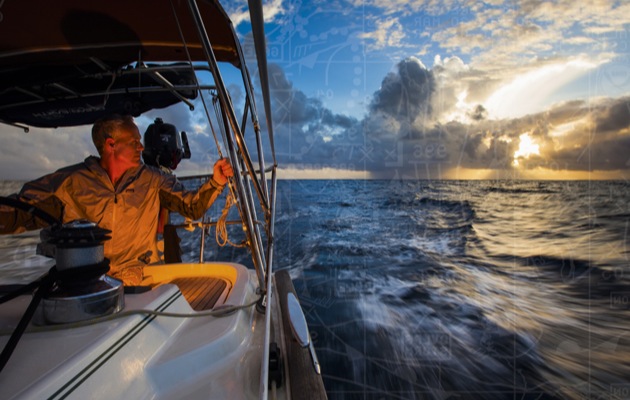
Offshore weather planning: the options for receiving weather data at sea
When I skippered a yacht in the first Atlantic Rally for Cruisers (ARC) 30 years ago the weather planning information…
I equate the amount of noise on board to be in inverse proportion to the sum of knowledge. I do find that being on a boat with a skipper who stands behind the wheel shouting at the crew is not much fun and, if asked back, will generally decline the invitation.
There is something great about helming your own boat in a race, but if you are also trying to run all aspects of the boat from behind the helm you can get stressed. Then your helming declines as your concentration jumps from one task to another.
It is much better to have a crew boss or mate who controls the running of the boat, managing manoeuvring instructions and allowing the skipper to concentrate on helming. The alternative is for the skipper to manage the running of the boat and have a different helmsman. Large racing boats will often have separate helmsman, navigator and tactician, with the skipper in overall control.

This is another important lesson: delegation and training. There are many decisions taken on board that really do not need to involve the skipper once a general plan has been made.
For example, does the skipper really need to micromanage all the food that is bought for a transatlantic passage ? By delegating a large proportion of the running of the yacht to others it does free up the skipper to focus attention on the more important issues.
5 top tips for a good skipper
- Communicate clearly.
- Stay calm and confident.
- Promote fairness and listen to your crew (treat them with respect).
- Be cheerfully available at all times, whenever called.
- Act decisively.
I skippered a yacht in the BT Global Challenge where everyone on board had an area of responsibility, although things would be discussed. We split things up in a number of ways: for example, one crewmember, who worked in the oil industry, was the safety officer.
It was their responsibility to make sure all our safety equipment was in working order and serviced. They would also give a safety briefing to new crewmembers as to where equipment was stowed and how it should be used.
By giving responsibility to a crewmember, it relieves some of the skipper’s duties, but more importantly it helps crew quickly become part of the team. During the last ARC one of our crew arrived only a couple of days before the start – immediately he set to work on a jobs list and his comment afterwards was that it allowed him to familiarise himself with the boat and made him feel part of the crew.
Part of the skipper’s job is to explain and teach; it is pointless to get angry at a crewmember for doing something wrong if they have never been shown how to do it right.
Although it is often easier to do something yourself than explain how it should be done, it is important for other members of the crew to be able to tackle particular jobs.
Then if something needs doing in a stressful situation they will not be doing it for the first time under pressure, when something is very likely to go wrong.
Some crew may not be very experienced, but all should be willing to learn – with a bit of help and encouragement they will soon become efficient crewmembers, whether for a day’s sail, or an ocean passage . I find it easier to hand over the helm when showing what I would like done rather than trying to do it from a fixed place with divided concentration.
You only have to watch manoeuvres in a marina for a short time to spot a boat getting into difficulties and a significant amount of shouting and swearing starts. The skipper has lost control of the boat and will shortly lose control of the crew, then will spend a long time contemplating the wonders of single-handed sailing.
It is important to get away from the blame culture. If something is done wrong a quiet word will be more effective than balling somebody out; most people are upset when they do something wrong and I see no point in making it worst by public humiliation.

As a skipper it is important always to be available and never to be upset or grumpy at being called, even if it turns out not to be necessary. I recall one dark night in the English Channel when the crew on watch were discussing a ship.
One was quite certain that we were passing behind the ship, the other equally certain we were passing in front. On hearing this I got up to find that there was a ship close by and where one crew was seeing the running lights, the second was seeing lights at the stern and in front of us was a wall of steel! A (very) quick gybe and all was well.
I will never ask anyone to do something that I would not be prepared to do myself; whether changing a sail on the foredeck at night in a gale, or climbing the mast . While younger, fitter crewmembers might be better suited to the task, is it safe or right for them to do it? I look at the task and ask myself would I do it? If the answer is yes I do it myself or, if the volunteer will do it better, then I may be persuaded.
If however the answer is no, then we must find another solution. As I get older I may have to change my thinking as it gets more difficult to do the tougher physical activities.

Safety first – Angus Fuller
- Safety, safety, safety – make this a priority, not just on deck, but below: in the galley, moving in the interior, even in the heads.
- Wear lifejackets at night. Always.
- Respect the environment, particularly with a view to pollution.
- Remember you can’t do everything so delegate/rely on crew wherever possible.
- Carry out drills before departure, ensure all crew understand their roles during any scenario. At halfway, have a chat, table top drill or even a full drill in order to keep the crew refreshed.
- Pay attention to detail. This applies to pretty much everything, from maintenance of systems to presentation of the yacht to monitoring the weather .
- Communicate the plan to the crew: a daily briefing on weather (lunch time is ideal), route, any change in this owing to weather and why. At sunset, issue night orders for changes in wind speed and direction.
- Ensure clear parameters are set with the crew so they know when to wake the skipper in the event of changes in weather, shipping, landfall, etc.
- Never be afraid to brief the crew before a manoeuvre – and a debrief after a manoeuvre can be a very useful process for both the skipper and crew.
- Reef when you first think about it – invariably performance doesn’t suffer that much (and is often improved) if it’s a marginal decision.
- Aim to have the yacht arrive in the same condition, or preferably better, than when you departed. By definition this means you will be looking after the yacht properly during the passage.
- Know the cruising area or stretch of water being transited. If you don’t, then heavily research it.
- Exercise seamanship to the very best of your ability at all times and instil this in your watch leaders from the outset.
- Assemble a crew who aren’t just good sailors, but compatible personalities too.
Fairness is all
You also need to be fair, whether this means splitting the watch times so all the crew are happy, or balancing meals and meal preparation. Fairness is important and it is easy to fall into routines where one person feels unfairly treated.
At the start of a long ocean passage on my boat one crewmember, who did not suffer from seasickness , ended up making drinks and snacks for everyone; this became the norm and after a few days they became unhappy because they were doing more than their fair share of galley duties.
Small things like that can quickly become big on a boat at sea. Another time I had a habit of always running the generator and watermaker at the same time of day; this became annoying for the off-watch as it made sleep more difficult, something I was not aware of at first as it did not affect me. Having a time where everyone comes together, maybe meal times, can be a good time to address small issues before they get bigger.

Part of a skipper’s responsibility to the crew is safety and this is not only their direct personal safety, but also the maintenance of the boat and equipment.
I find it useful to have plenty of discussions about what could go wrong and the equipment we have on board and how it can be used.
Man overboard practices and fire drills should be done as a matter of course, but it not always that easy, particularly on short voyages. However, a safety briefing should be done for all new crewmembers even if they are only on board for a daysail.
What is perhaps not so comfortable for skippers is having to resolve interpersonal problems. This may just involve switching the watch system around, or may mean you have to ask someone to leave: not a nice job for anyone to have to do, but a happy boat tends to be a safer boat – and faster if racing.
One problem that can become an issue on races and rallies is how hard the boat will be pushed. What might be pushing hard for a racing person will be different for a cruiser and it is easy for people to become apprehensive (or plain scared) when out of their comfort zone.
Then there is the issue of money on cost sharing or paying your way boats. It is important before committing to sail together to have a firm agreement on what is expected on both sides.
It should also be clear who is paying travel costs as, although a boat may be legally responsible for repatriating crew, most non-commercial yachts expect crewmembers to be responsible for their own travel.
Who’s the leader?
There can be times when a crewmember may be as experienced (or maybe more so) than the skipper. This can cause tension and insecurity in the skipper’s position.
For a day or so it should not be a problem, but on a longer passage a feeling of being undermined can set in. As a skipper it is useful to be open to ideas, they may be better than yours as everyone’s experiences are different, but at the end of the day the yacht is your responsibility.
Trying to get a balance between listening to, but being able to reject ideas may not be easy and can be a difficulty when taking on crew that you may not have sailed with in the past.
I have seen this a number of times in the ARC where a boat has taken on an experienced crewmember, but it has blurred the lines as to who is the skipper and caused tension.
I do find choosing a crew difficult; it does partly depend on what I am intending to do. For a long passage an enthusiastic, positive person will make up for any shortcomings in experience.
We all have to live together so getting on is important, along with a willingness to share all tasks. As we are sharing our boat, which is our pride and joy, respecting and looking after it should be a priority.
Damage will occur and owners/skippers need to be prepared for this, but a carelessly dropped saucepan on the newly varnished cabin sole is avoidable and immensely irritating.
My ultimate test is: would I be happy working on the foredeck in bad conditions with this person? A definite no-no for me is laziness, particularly crew not willing to muck in with the bad bits as well as the good.

Speak to your crew – Tom Cunliffe
- Communication is key. No ‘mushroom management‘.
- Listen/watch, crew and boat.
- Remain cheerful, or at least positive, even when woken during your watch below.
- Above all, make sure all hands are running on the same ‘motivation fuel tank‘. If they all want the same thing, you are three-quarters of the way to a happy ship.
- By all means communicate legitimate concerns, but never irrational anxieties.
- Sit down before you start, agree ship’s articles and all sign them. Everyone must know their duties. If money is involved, details of this must also be inscribed, as well as a probable route with contingencies. Then, when things turn to the bad and aggro starts, you get out the articles and read them together. End of problem (given to me by one crew of Sandefjord , which sailed in the 1950s from South Africa).
Judging competence
Choosing a skipper also has its pitfalls. Experience and competence is difficult to judge on first meeting and going for a sail together is important. Personally I would avoid a shouter at all costs.
Competence levels are more difficult to measure, but a well-run, tidy boat is a good indicator while one with a long jobs list could indicate that things have slipped.
A quick look in the bilges and at the engine can give a clue as to maintenance and a check on lifejackets will show thoughts on safety. I recently did a safety check on a yacht for an event to find that the owners had brand new top of the range lifejackets for themselves while the crew ones were old, without lights or sprayhoods. I am not sure I would have enjoyed sailing on that boat!
Skippering a yacht well is not an easy task, there are so many aspects to the job. It becomes easier with experience and there is no substitute for miles sailed. Good sailors are not necessarily great skippers, but good skippers must also be good sailors.
I have a great deal of respect for the late Sir Peter Blake and, although I never had the privilege to sail with him, I sailed against him on two Whitbread Round the World races . He always found time to have a friendly word and generated great crew loyalty on board his boats.

Be the best leader you can – Jim Thom
- It’s becoming progressively easier to access sophisticated weather information. A good skipper will prepare the yacht for the actual weather, not the forecast he/she’d like.
- Monitor the yacht’s position and the conditions, high and low-tech, from radar/chart plotter to barometer. Even though electronics are increasingly failsafe, a good skipper keeps a record on paper, in the log and on a chart – even the most advanced yachts can be struck by lightning , or suffer power failure . A good skipper will also listen to their senses, and to their sixth sense. They’ll ask themselves where that low swell is coming from or why the seas have become steeper. Shallow reefs may tint the underside of clouds green or blue, and the sound of breakers will hopefully never come as a surprise. Rain has a distinctive smell at sea, as does land and your nose will tell you when ice is near.
- A good skipper will look for the ‘horseshoe nail’ – lost from the messenger’s horse, it triggered the chain of events that lost a kingdom. Regular checks of the yacht, including sails and rig, deck fittings, bilges, steering, engine and machinery, will help the skipper and crew stay ahead of the law of entropy, and out of the incident pit.
- Create a flexible structure without being overly prescriptive. Agree standard practice with the crew: how lines should be made off on a cleat; how to use and make fast on a winch, how to shake out a reef, how to make engine checks, etc. Establishing basic procedures avoids surprises and allows crew to develop skills and think further. A good skipper will prevent boredom and apathy by agreeing daily routine maintenance tasks and helping to develop projects that improve the yacht and teach useful skills on board.
- A good skipper’s best attributes are not related to technical expertise, but to self management, leadership and communication skills. If you develop a set of team and personal goals then a common understanding will prevent many hot spots from forming.
- A good skipper will try to manage their own emotions, knowing the effect they can have on morale. They’ll keep an eye on each member of crew and on the mood of the team, finding reasons to celebrate together – crossing the line, halfway point, a birthday, a good day’s run, or just a great day at sea.
About the authors
Chris Tibbs is a meteorology and weather router, as well as a professional sailor and navigator, forecasting for Olympic teams and the ARC rally.
Angus Fuller is a professional skipper, MCA Chief Mate 3000GT (yachts), who has made 29 transatlantic crossings, 21 as skipper, and one transpacific crossing as skipper, plus one circumnavigation upwind and sailed over 300,000 miles.
Jim Thom has been skipper of a Robert Clarke sail training yacht, a Baltic trader, a Clipper Round the World Race yacht and for four years was captain of the Fife design Kentra . From 2003-2012 he was captain of the 125ft Fife 19 Metre Mariquita with his wife, Lucy, as mate.
Tom Cunliffe is a Yachtmaster Instructor Examiner, author of numerous books on seamanship and is a contributor to Yachting World , responsible for our ‘Great Seamanship’ features.
- Exploring the Role of a Skipper in Boating and Sailing
The term " skipper " holds a prominent place in the world of boating and sailing, representing the individual tasked with the operation, navigation, and overall management of a vessel. Whether it's a small boat, a luxurious yacht, or a sailing dinghy, the skipper plays a crucial role in ensuring the safety and smooth functioning of the maritime journey.
Boat Skipper and Yacht Skipper:
The title "boat skipper" is a broad term encompassing individuals in charge of various types of boats , while a "yacht skipper" specifically denotes someone overseeing the operations of a yacht. Both positions require a comprehensive understanding of navigation, safety protocols, and the ability to make informed decisions while at sea.
Charter Skipper:
In the realm of chartering, where individuals or groups rent boats for recreational purposes, a charter skipper may be hired. This professional takes the helm for those who may lack the necessary expertise, ensuring a safe and enjoyable experience for all on board.
Sailing Skipper and Skipper 12 Sailing Dinghy:
A "sailing skipper" is someone well-versed in the intricacies of sailing, adept at harnessing the power of the wind to navigate the waters effectively. Meanwhile, a "Skipper 12" refers to a specific type of sailing dinghy , a smaller boat designed for sailing enthusiasts.
Read our top notch articles on topics such as sailing, sailing tips and destinations in our Magazine.
Sailing a Yacht for the First Time:
For those embarking on their maiden voyage aboard a yacht, having an experienced skipper on board is often recommended. Navigating a yacht for the first time can be a complex endeavor, and the guidance of a seasoned skipper ensures a smoother introduction to this maritime adventure.
Hiring a Skipper:
Individuals who own boats but lack the necessary skills or time to operate them may opt to hire a skipper. This allows them to enjoy the pleasures of boating without the responsibilities and challenges associated with captaining the vessel
Read more useful sailing tips:
How to become a yacht/boat skipper:.
Aspiring skippers often undergo training and certification processes to acquire the skills and knowledge needed for the role. This may involve learning about navigation, safety procedures, and gaining hands-on experience in boat handling.

Skippers Choice Marine Supply:
In the marine industry, businesses like "Skippers Choice Marine Supply" cater to the needs of skippers and boat enthusiasts, providing a range of products and services to enhance the boating experience.
In conclusion, the term "skipper" encompasses a diverse range of roles in the maritime world, from steering a small boat to captaining a luxurious yacht. Whether hired for a charter, sought for guidance in sailing, or responsible for the day-to-day operation of a vessel, the skipper is a central figure in the world of boating and sailing, ensuring safe and enjoyable journeys on the water.
So what are you waiting for? Take a look at our range of charter boats and head to some of our favourite sailing destinations .
- Yachts for Sale
- Sales Report 2024
- FAQ – Luxury Crewed Yacht Charters
- FAQ – Bareboat charters
- FAQ – Sell your Boat
- FAQ – Buying a Yacht
- How Much does it Cost to Charter a Luxury Yacht?
- All Blog Posts and News
- Yachting for beginners
- Indian Ocean
- Mediterranean
- Sales & New build
- Motor Yacht
- Event & News

Skipper’s Job and Responsibilities: What You Should Know
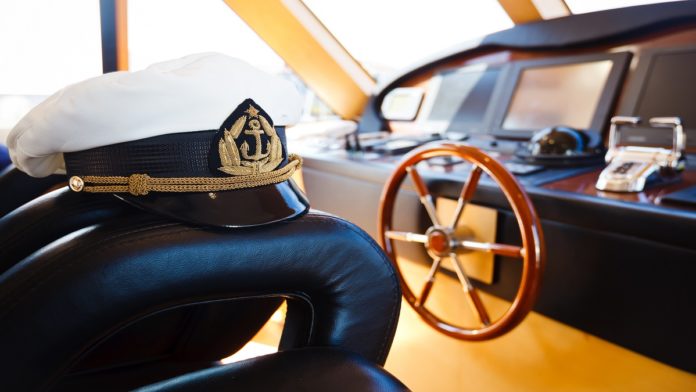
What exactly does the Skipper’s job entail? And what are their specific responsibilities? In this blog post, we’ll delve deeper into the world of sailing and explore the various duties and obligations.
What is a skipper?
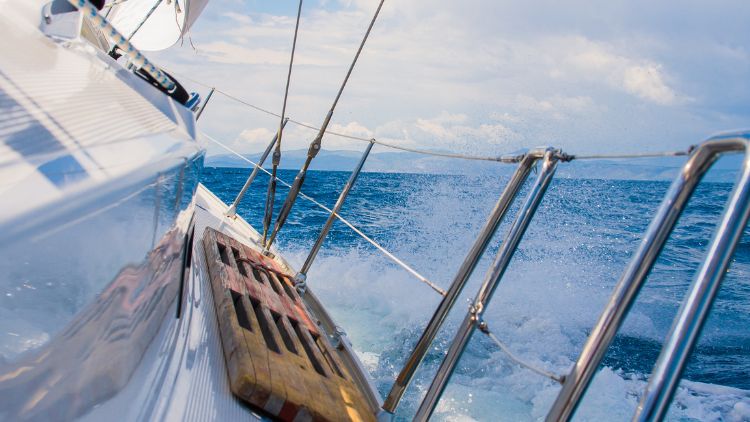
A skipper is great when you want to rent a bareboat but you do not have a licence
When it comes to renting a bareboat without a license, hiring a skipper is always a wise choice. This is especially true for people who lack the knowledge and experience to sail on their own, or for those who want to enjoy a stress-free and relaxing vacation on the water. But even experienced sailors may need to hire a skipper in certain situations, such as when they want to explore new waters or unfamiliar destinations, or when they simply want to sit back and enjoy the scenery without having to worry about navigation and other technicalities.
Hiring a skipper is a great idea to learn how to operate a boat safely
When embarking on a bareboat charter, it is essential to ensure that safety is the top priority. One great way to learn how to operate a boat safely is by hiring a skipper. Not only do skippers have years of experience operating boats in various conditions and environments, but they also have extensive knowledge of safety guidelines and protocols. By having a skipper on board, you can learn firsthand the best practices for navigating through unfamiliar waters, avoiding potential hazards, and handling emergency situations.
You could get a skipper if you don’t want the hassle and stress of handling the boat you are renting
If you are embarking on a bareboat charter but don’t have experience sailing a yacht or simply want to avoid the stress and hassle of doing it yourself, there’s no need to worry. Many charter companies offer the option of hiring a skipper to take care of the sailing for you. A skipper is a professional sailor who has the necessary expertise and qualifications to navigate the waters safely and efficiently. They are also knowledgeable about the area and can offer valuable insights on great destinations, local attractions, and hidden gems. Hiring a skipper can be an excellent choice if you want to sit back, relax, and enjoy the stunning views and warm breeze of the open sea without any worries.
Read also: Yacht Rental With Skipper And Hostess Vs Fully Crewed Charters
What is the difference between a skipper and a captain?
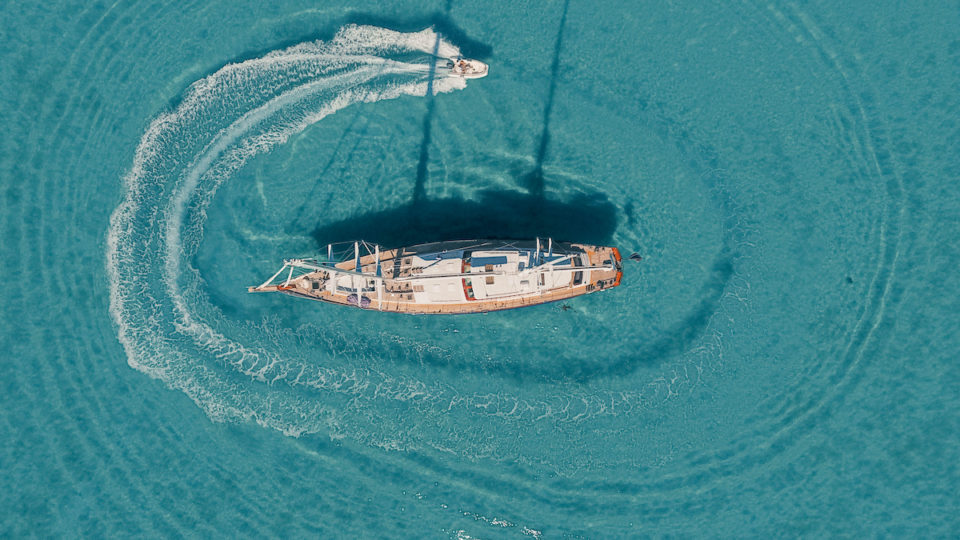
Like car licenses, there are different categories. But here’s the catch: it’s not just about the category, it’s about your practical experience and the miles in your logbook that really matter.
Believe it or not, you can charter a yacht in Europe with a Bareboat Skipper (IYT) / Inshore Skipper (ISSA) / Day Skipper (RYA) license. This beginner category allows you to sail 20 miles offshore during daylight hours in good weather. However, if you go beyond the 20-mile limit and encounter any issues with your yacht, your insurance might not cover it. Recently, some countries, like Greece, have started to impose restrictions on chartering yachts for skippers with “day licenses.”
The next category is the Coastal Skipper / Offshore Skipper. With this license, you can sail up to 60 miles offshore at night, still in good weather.
And finally, we have the highest category: Yachtmaster / Master of Yacht. With this prestigious license, you can embark on challenging sailing expeditions, including crossing the Atlantic. This license is truly a badge of honor among yacht owners.
What is the cost of a skipper?
The cost of hiring a skipper for a week can range from €250 to €350 per day. For a longer duration, the cost may decrease slightly. However, during peak season, the cost may be higher due to high demand. It is also important to note that in some countries, it is mandatory to hire a skipper if you do not have the necessary qualifications to sail.
Skipper’s job involves a lot of responsibilities that should not be taken lightly. Not only is he in charge of ensuring the safety of his passengers and crew, but he also plays a crucial role in protecting the marine environment and preserving its natural beauty.
Furthermore, Skipper must have extensive knowledge and experience to navigate the waters confidently and smoothly, as well as to handle any unexpected situations that may arise. He must also be an excellent communicator, able to easily convey important information to his passengers and crew, and be approachable and attentive to their needs.
Overall, being a Skipper is a challenging but rewarding career that demands a range of skills and capabilities. If you are planning a boat trip or thinking of pursuing a career as a boat captain yourself, it’s crucial to understand Skipper’s job and responsibilities fully. Only then can you appreciate just how much he does and how much he can contribute to making your boating experience safe, enjoyable, and memorable.
Read also: Mediterranean Yacht Charters: The Full Price List
RELATED ARTICLES MORE FROM AUTHOR
Luxury crewed yacht charters – frequently asked questions, luxury yachts for charter perfectly suited for 10 guests, trimaran vs catamaran: what are the differences.
- Testimonials
- Privacy Policy
- Open search box

A comprehensive guide to hiring the perfect yacht skipper
Essential skills, platforms to look at, and expert hiring advice. Dive into our comprehensive guide with a vetting checklist for your yacht's skipper.
Yachting evokes images of boundless freedom, where azure waters meet endless horizons, and luxury joins the primal allure of the sea. But beneath this dance of opulence and open waters, there's an art and science that ensures every voyage is seamless. The maestro? The yacht skipper. Sometimes, the boat owner assumes this pivotal role, while others may opt for hiring a professional crew.
In this article, we'll journey through the multifaceted role of a skipper, exploring the breadth of their responsibilities from navigation to guest relations. We'll guide you through the avenues available to find the right candidate, the crucial skills to look for, the intricacies of the hiring process, and a comprehensive checklist to assist you every step of the way.
Yacht crew recruitment: what is the skipper’s role?
On a motor yacht , crew configurations often reflect the owner's specific needs and desires. Some opt for a comprehensive setup, bringing roles such as the Chief Steward or Stewardess for tailored guest experiences, a dedicated Chef for gourmet dining, and, on larger yachts, a Purser for administrative oversight aboard. Conversely, others might prefer a streamlined team, focusing on only the essentials like a Chief Engineer for technical needs and a Deckhand for general upkeep. Yet, regardless of how expansive or minimalistic the crew setup is, central to all these configurations is the Skipper.

Countries like Malta, Bermuda, and the Bahamas allow skippers to officiate weddings on board, turning maritime journeys into romantic celebrations.
Where to find a yacht skipper?
The good news is you're never short of options. Whether guided by trusted endorsements, budget constraints, or a thirst for discovery, the horizon is dotted with promising leads. Here's where you might strike gold on your quest:
Source | Description | Pros | Cons |
|---|---|---|---|
Yacht Crew Agencies | Professional crew recruitment agencies are well-versed in the maritime industry and have a roster of qualified skippers. | Vetted candidates. Industry expertise. | Agency fees. Limited pool. |
Online Platforms | Dedicated websites and apps for yacht owners to post vacancies or browse skipper profiles. Often have reviews and ratings. | User reviews. Wide reach. | Varying reliability. Information overload. |
Maritime Schools & Training Institutes | Liaise with schools for graduates who are well-trained in modern navigational methods. | Fresh talent. Modern training. | Less experience. Narrow specializations. |
Word of Mouth | Personal recommendations from other boat owners, crew members, or maritime professionals. | Direct referrals. Trusted sources. | Biased views. Limited range. |
Yacht Clubs and Marinas | Hubs of networking within the yachting community. Members might know skippers familiar with local waters and regulations. | Local expertise. Networking opportunities. | Limited to region. May lack specialization |
Key skills to look for in a powerboat skipper
When evaluating potential skippers, it's easy to hone in on obvious attributes: vast sea hours, proficiency in navigation, and a commanding presence. While these traits are undoubtedly crucial, delving deeper might reveal other essential yet overlooked competencies. How often do we consider a skipper's adaptability in unforeseen scenarios? Or their capacity to foster crew cohesion? What about their finesse in guest relations?
To simplify this, we've categorized the critical skills into six distinct areas, providing a more transparent lens through which to assess potential candidates.

Day Skipper: What you need to know to get through
- Theo Stocker
- September 25, 2020
With her husband Theo out of the way, Georgie Stocker shows on her Day Skipper course that she is more than capable of taking charge

Georgie wanted to complete a Day Skipper course to build confidence in her sailing ability. Credit:Theo Stocker
It was Theo who suggested I take my Day Skipper course.
I’ve grown up sailing, and even worked as a dinghy instructor for six months, but my yacht sailing career started as a competent sunbather on family charter holidays in Greece.
Later, I progressed to longer trips in cooler climates with my boyfriend, now husband, Theo, where, being just the two of us, I had a more active role and learnt far more.
We have done multiple trips on different boats.
I have rounded headlands, dodged fishing vessels and stood night watches.
As with many sailing couples, however, I defaulted to crew and left much of the navigation and pilotage in Theo’s capable hands.

Georgie wanted to learn and practice navigating a boat on her own during the Day Skipper course. Credit: Theo Stocker
My recurring nightmare when planning sailing trips with Theo is, ‘What would I do if he went overboard and would I be able to get him back? Would I manage if he was ill? Could I manage a boat on my own?’
These thoughts have been bugging me for a few years.
I hoped the Day Skipper course would increase my confidence in my sailing ability, help me to brush up on skills such as man overboard and coming in and out of berths.
I also wanted to learn and practise how I would go about planning a passage and navigating a boat on my own.
I wanted to know that I could go sailing without Theo and be an equal partner in planning, preparing and skippering our trips.
Theo was happy to help me prepare and I set about studying.

Plotting a course at the chart table. Credit: Theo Stocker
It was only when I started looking through the RYA course books that I realised the extent of the task I had taken on.
Tides, secondary ports, pilotage… it all seemed pretty overwhelming at first.
However, after a week’s holiday grudgingly spent doing navigation exercises and going through the theory, I began to feel like I was finally getting the hang of navigation.
I still felt a bit rusty though.
I had the course booked for the beginning of August and realised I hadn’t been on a boat, excluding the Norfolk Broads, for nearly a year.
Thankfully, a sailor at a local club offered to take me out on the water for a day to knock the rust off.
It was so useful to go over basic boat handling, safety, the engine and practical chartwork to get my sea legs back before the course.
After all this preparation I felt ready, albeit a bit nervous, especially after being grilled at the last minute by my dad on the phonetic alphabet.
Apparently ‘A for apple’ doesn’t quite cut it on VHF radio.
I did the course on the Solent with Commodore Yachting from Gosport, who were brilliant.
They had me on a shiny new Bavaria 37, which, considering most of my sailing had been on a 31ft yacht or smaller, was a bit daunting at first.
As the only woman and probably half the average age of the rest of the crew I was initially rather intimidated.
Continues below…

Night sailing tips for first timers
Cruising after dark doesn't need to be stressful. Toby Heppell shares his tops tips for night sailing

Competent Crew: On course for cruising harmony
Katy Stickland joined an RYA Competent Crew course to find out why instruction can make life as a sailing couple…

Best waterproof jackets and salopettes for offshore sailors
The biggest storm should be water off a duck’s back in these rugged offshore waterproofs. The YM team put six…

Best sailing jackets and pants for boaters
Sailing waterproofs needn’t break the bank. YM put seven sets of inshore and coastal oilskins under £350 to the test
The other two on the course both had their own boats and had been sailing for far longer than me, but they all were very friendly and I soon felt at my ease as one of the crew.
After some introductions I was set the task of planning the passage from Gosport to Cowes.
Equipped with my notes, and with the promise of a drink in the pub with the crew, I managed to get a passage planned in record time — for me.
The first two days were intense.
We took it in turns to skipper and plan the passages and pilotage.
We enjoyed great sailing and practised picking up mooring buoys — the lasso technique was my favourite, although I did get in trouble for not saying the required ‘Yee-hah!’ after throwing the line.
On the first night we conducted a night navigation exercise from Beaulieu to the Hamble.
I had done night passages before but never pilotage into a harbour at night .
I loved working out what all the lights were and using the leading lights to navigate in.
With the help of lots of cups of tea and biscuits, we managed to find our way safely into Swanwick Marina.
A slower start followed the next morning, with a full English breakfast and some time looking at engine maintenance and checks on board.

Crew and instructor kitted out for bad weather. Credit: Theo Stocker
With growing confidence in my abilities as a skipper, we were informed a storm was on its way.
Force 7-8 winds were forecast. Yikes!
Theo and I had been out in some windy conditions before, but it was going to put the first two days’ skills to the test, as well as my waterproofs .
Although I prefer sunshine and calmer waters, the thrill seeker in me relished the exhilaration of strong-wind sailing.
It was a great opportunity to practise coming alongside berths, picking up buoys and anchoring in adverse conditions.
I was surprised, however, when our instructor John shouted ‘Man overboard!’ and said the manoeuvre should be done under sail while the wind was gusting over 34 knots.
With the dummy safely aboard, we made our way into the shelter of Gosport.

Georgie had a lot of prior sailing experience before taking her Day Skipper course. Credit: Theo Stocker
After mooring up to a buoy we had chance to look at a bit more of the theory, including weather forecasts, towing and helicopter rescues.
The final day was spent refining our skills as well as finishing off the food stores.
It was a great week and a chance to hone new skills.
It was also the first time I had sailed without Theo in a long while and I think the course challenged me to step up to the role of skipper.
I feel I can now fend for myself afloat and am a lot more confident in my boat handling skills, my leadership, theory and general boat husbandry.
Theo was thrilled that I passed and relieved to know that, if he goes overboard, both his and my chances of survival have markedly improved.
Day Skipper skills
We practised picking up mooring buoys in different conditions: approaching on a close reach under mainsail as well as against the tide, approaching downwind under headsail.
A new technique I learnt was lassoing the buoy.

Georgie picks up a mooring buoy with a lasso. Credit: Theo Stocker
This is done by using a line and attaching to two cleats at the bow, ensuring that the line is forward of the forestay and over the anchor; then coiling the remainder of the lie on the approaching side and using a two-handed throwing method to lasso the buoy on the approach.
This is great in strong winds and tides as it gives time to use the lines to steady the boat so that the bowline/secondary buoy can be retrieved and brought on board without having to hold the weight of the boat on a boat hook.
Heave to for man overboard pick-up
We practised a number of techniques for picking up a man overboard during the Day Skipper course and this was probably my favourite.
In this example man overboard is called, the helmsman should count for two seconds then go through the wind with the foresail cleated to back, while releasing the main sheet and starting the engine.

Hove to with the engine on for a man overboard situation. Credit: Theo Stocker
After the mainsail has filled and the headsail has backed, steer into wind to keep the boat hove to.
A short blast of astern power also helps to slow the boat and enable it to drift downwind onto the man overboard.
The engine can then be used to line up the boat with the man overboard (this was mostly in astern) and retrieve the buoy.
I had never used this technique before but found it a much quicker and more reliable method.
In my view, if sailing with just two of you on board, it is much easier than having to drop the sails completely , and means you stay close to the casualty.
‘Woble’ your engine daily
On the course we learnt how to do an engine check, the parts that need checking and what to do if there was a problem.

Being methodical with engine checks prevents any on board wobbles. Credit: Theo Stocker
The acronym ‘Woble’, takes you through the checks in order:
W — water levels: check the filter and the antifreeze water level O — oil: check both the gear box oil and the fuel oil B — belts: checking the tension of the belts can be done by a short twist. If you can twist more than 90° it’s too slack L — look for leaks E — exhaust is pumping water
I found this methodical approach helpful to ensure that I didn’t miss anything.
Spring from a pontoon mooring
During the week-long Day Skipper course we went in and out of different kinds of berths in different conditions, multiple times.
Using a spring to leave a berth in either direction was something new for me.

Bow moves out whilst going astern. Credit: Theo Stocker
I had seen it but never done it myself and it worked brilliantly when the wind was holding us onto the pontoon.
In this technique we used a bow line, stern line and a spring from the stern to a cleat well forward on the pontoon.
Having let go of bow line and stern line we powered astern, causing the bow to swing out away from the pontoon and bring the stern in.
The engine is then put in forward gear to leave the pontoon.
Something I found helpful was to not remove the spring until there is forward motion to prevent the bow being blown back onto the pontoon.
We also learnt that all the lines should be set up to be slipped from on board, and that the shorter end of a line is released to avoid lines fouling on the pontoon.
Navigation and pilotage into harbours — day and night
On board we planned pilotage into and out of marinas and harbours.
While the planning seemed arduous at first, we soon got quicker at finding the right charts, calculating tide times and height, checking what lights or buoys to look out for, whether there were transits or back bearings to use and identifying any dangers and clearing bearings for these.

Pilotage into a new harbour can be a rewarding experience. Credit: Theo Stocker
For the night pilotage into the Hamble, the GPS was really helpful, but we also wrote up a plan to use on deck.
This gave us a quick reference of the pilotage with the bearing to each buoy and light, and rough distances and times.
I had never used leading lights before, so this was really good to practise, ensuring a safe passage into the mouth of the Hamble avoiding Hamble Spit.
Getting the lights for the different cardinal marks right – they can be difficult to identify – was also a key lesson to keep us safe.
Safety briefing
During the week we gave several safety briefings.
Knowing what to tell a novice crew before sailing, without overloading them, is a skill, and having a clear outline of what to cover really helped.
Demonstrating how to put on a lifejacket and how to check it fully is a good idea.

Teach your crew to check lifejackets. Credit: Theo Stocker
The briefing on deck included explaining how to use the liferaft, and how to move around safely on the boat.
As we had strong winds throughout the week there were a number of times when we were clipped on.
As skipper, making sure that the crew are safe, as well as increasing safety precautions depending on the conditions, helps to avoid unnecessary man overboard drills.
How did Georgie do on her Day Skipper course?

Instructor John Hopkins of Commodore Yachting presents Georgie with her Day Skipper certificate. Credit: Theo Stocker
Instructor John Hopkins gives his verdict

Georgie Stocker is a qualified dinghy instructor and has cruised yachts in the UK, the Med and the Baltic. She and her husband Theo own a Sadler 29. Credit: Theo Stocker
‘The three crew on the boat were all working towards their Day Skipper and all had a lot of prior sailing experience.
‘Martin and John both have their own boats and wanted proof of competence, as well as updating and checking their skills.
‘Georgie obviously has a lot of miles and time afloat under her belt, so once I had introduced a task or skill and everyone had a go, we could spend time practising and refining it.
‘We had a very windy week, but that’s much better than no wind.
‘It is no mean feat to pick up a man overboard under sail in a Force 7 as Georgie did.
‘There were a few skills that needed practice, and her pilotage got quicker through the week, but it is usually obvious fairly soon if someone is at the level needed for Day Skipper, which Georgie was.
‘I think she finished the week much more confident in her own ability.’
RYA Day Skipper syllabus
What you need to know before you get on the course
5 days, 100 miles, 4 night hours on board a sailing yacht.
Theory to the level of Day Skipper.
Whilst it is recommended you attend a Day Skipper shore-based course beforehand, which includes an exam, you just need to be confident in doing the theory to the required level, as there isn’t time to learn this on the course.
What you will learn on the course
- Preparation for sea
- Deck work, navigation
- Pilotage, metorology
- Rules of the road
- Maintenance and repair work
- Victualling
- Emergency situation
- Yacht handling under power
- Yacht handling under sail
- Passage making
- Night cruising
How you will be assessed
Assessment will be by your instructor throughout the course.
There is no terrifying exam at the end of the week, so you should get feedback as you go along as to how you are getting on with each of the skills and tasks.
About Commodore Yachting
Commodore Yachting is a leading RYA training centre and yacht charter company based at Gosport Marina on the Solent. It offers all RYA sailing courses, taught by an experienced team.
Stuart Cooper started the company in 1999 with one yacht after leaving the Navy and now operates a fleet of seven Bavaria yachts from Gosport and has another boat based in Greece.
Enjoyed reading this?
A subscription to Yachting Monthly magazine costs around 40% less than the cover price .
Print and digital editions are available through Magazines Direct – where you can also find the latest deals .
YM is packed with information to help you get the most from your time on the water.
- Take your seamanship to the next level with tips, advice and skills from our experts
- Impartial in-depth reviews of the latest yachts and equipment
- Cruising guides to help you reach those dream destinations
Follow us on Facebook , Twitter and Instagram.

Skippers and Instructors - Charters
Explore our expertly picked yacht charter skippers.
Horizon Yacht Charters have several experienced and friendly Yacht Charter Skippers and instructors. Some of their profiles are shown below – click on the relevant link for skippers in your preferred base. We’ve built up and refined our team of Yacht Charter Skippers over many years into a select group of truly outstanding individuals, all keen and happy to offer you first-class service during your charter experience.
Click to play A Day in the Life of a Yacht Charter Skipper.
Yacht Charter Skippers – Click to watch a Day in the Life of a Check-out Skipper.
Yacht Charter Skippers
Captain cara – bvi skipper and asa instructor.
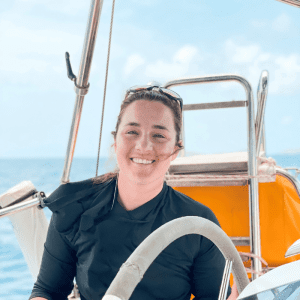
Originally from London, I grew up in Italy and have been coming to sail in BVI waters with Horizon Yacht Charters since I was a little girl.
I love getting people involved in sailing and fine-tuning their existing skills. I decided to become a yacht skipper and ASA sailing instructor because I want people to come away from their BVI sailing holidays having enjoyed the islands as much as I do. I have my ASA 201,203,204,205 and 214 certificates and also a Yachtmaster Offshore qualification so I bring a lot of experience to your holiday. My approach is always safety, fun, and success!
Most of my sailing has been in the BVI but I also have sailing experience elsewhere. I have sailed the majority of the Caribbean from the Grenadines to Puerto Rico and done yacht deliveries around the Caribbean, the coast of Spain, the UK, Gibraltar, from Annapolis to Bermuda and then Bermuda to the BVI. I’ve cruised Croatia and raced around the Solent in the UK, including competing in Cowes Week.
I can also tell you lots about everything you see under the water and I’ll enjoy showing you the best snorkelling spots and beaches. I’m also a fully qualified personal trainer, PADI open water diver (and ski race trainer – just in case you need tips for the next ski season!). I speak English, French and Italian fluently.
Before starting work for Horizon in the BVI, I competed for 10 years as an alpine ski racer as a member of the British National Team, reaching the World Cup level. The switch from skiing to sailing felt natural for me as I moved from one outdoor environment to another.
My passion to be the best comes through in everything I do and I look forward to sailing with you.
Cara has been honoured as an ASA Outstanding Instructor of the Year 2022. This award honours the top 1% per cent of all active-status ASA Instructors. This well-deserved recognition highlights Cara’s exceptional teaching abilities and dedication to student success, making her an invaluable asset to our Horizon Sailing School.
This is what our clients had to say recently:
“Thanks so much Cara. Most incredible instructor, skipper & chill company. So glad to have met you.” – Sonnen, Remy, Peter and Natalie
“We are so happy we had Cara as our 24-hour captain. Her knowledge and calmness made our 1st day in the BVI great.” – The Gumbys
“Cara, this was such a perfect week – we are leaving with a huge amount of confidence and enthusiasm and I’m so truly thrilled to be able to take my kids on the trips that were so important to me” – Katie Schmid
“An incredible week sightseeing, snorkelling, and some great stops for overnight. Cara’s knowledge of sailing is tremendous, she answered all our questions, always made us feel safe, and was a great teacher.”
“Cara was awesome, she even gave us her personal cell phone number. She always responded to questions happily. A pleasure to have a board”
“Really liked the instructor, Cara Brown, as we all got on so well during our 9 days.” Robert Thompson
Read the interview with Captain Cara, ASA featured sailing instructor
Captain Dom – BVI Skipper and ASA Instructor

I’m from the UK but since starting working on yachts at 18 I haven’t looked back. I have spent my time on boats from South Africa to the Mediterranean and most recently, the BVI.
I am RYA Yachtmaster Ocean qualified, completing my training in the UK and in South Africa. My resume includes work on multiple superyachts in the Mediterranean, so I’m no stranger to excellent service, an Atlantic crossing, which gave me plenty of time to fine-tune my sailing skills and Captain on a 22m yacht based in Monaco which I safely navigated across France, Spain and Italy.
I have a range of skills from yacht maintenance to water sports and I pride myself on always giving guests a great experience in all aspects of their trip. Here are just some of his many reviews:
- “Fantastic time! Our skipper, Dom, was absolutely the best!” – Wade Barker
“Dom was awesome! Very knowledgeable and helpful. Explained everything in an easy-to-understand way.” – Patrick Whattey
“Captain Dom is the greatest! As is all the staff at Horizon. We had to alter our dates last minute due to a death in the family and everyone was very sympathetic and accommodating. Even prior to that incident, the whole Horizon family made our trip a breeze (no pun intended) and ensured that we had everything we needed as first-timers. Highly recommend this company.” – Nathan McElmurry
Captain Dani – BVI Skipper & ASA Instructor

Hi, I’m Dani, a Skipper and Instructor for Horizon. I was raised on the beaches of Northeast Florida in Jacksonville beach. My journey into the world of yachting started in Croatia, where I was a host on sailing vessels in 2018 and 2019. From that point on, sailing and exploration became my passion, leading me to sail in Portugal, Italy, Ireland, French Polynesia, and the Virgin Islands.
For the past four years I have proudly called the Virgin Islands my home. Initially diving into the yachting world I cultivated my culinary talents as a chef. I developed a love for sailing which led me to get my Yachtmaster Offshore after sailing in Ireland. I have since expanded my repertoire, now sharing my expertise by teaching the art of sailing in the idyllic setting of the British Virgin Islands.

Yacht Charter Skippers: Greg Allen – St Vincent Skipper
The sea has been Greg’s passion for all his life and consequently, his chosen career. He is extremely well qualified with his RYA Commercially Endorsed Yachtmaster and is very experienced. Greg has worked on dive boats, as the captain of a large private yacht, and as the owner/skipper of a sports fishing tour business in St Vincent (he also worked on the set of the Pirates of the Caribbean films, as a location scout and as the Director’s boat) In recent years, he has worked as a freelance skipper and as a delivery skipper. He is also a PADI-qualified dive instructor and a keen fisherman. He considers of prime importance the comfort and safety of his crew and guests alike and the immaculate condition and maintenance of whatever boat he captains. He is a relaxed, convivial captain who will make you feel at home.
“Greg is an excellent sailor/skipper! His knowledge and explanations were fantastic” ~ Kaczmarek
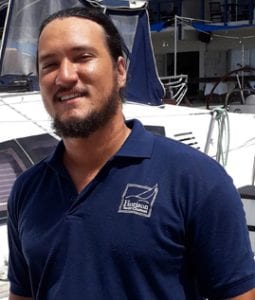
Brian Mascoll – St Vincent Skipper and ASA Instructor
Brian Mascoll is an ASA-certified instructor qualified to teach courses from the basic keelboat sailing course (ASA101) through to the Bareboat cruising course (ASA104) and the Catamaran cruising course (ASA 114). From St.Vincent and the Grenadines, Brian grew up in a small fishing village. Being so close to the waterfront, he would spend most of his free time at the beach, snorkelling and spearfishing and being around boats with his older brother and dad. He also got involved with helping the local fishermen, and this is where he developed his love of the ocean. Brian became one of the youngest divemasters in the region and then ventured on to achieve his sailing certifications and to work as a professional skipper. Never stopping, Brian then went on to achieve his ASA instructor qualifications and now works for us as either a skipper or ASA instructor.
“Just wanted to drop you a quick note on the trip. It was FABULOUS!! We had a fantastic time!! The boat was wonderful and Brian, our captain, was wonderful! We plan on doing another one in the future.” ~ Scrobola

Laura Hadaway – St Vincent Charter Chef
Laura was born and raised in St. Vincent and the Grenadines, 30-something years ago (she has stopped counting) Cooking and the sea were both an integral part of her early life.
Growing up with fresh local cuisine at her disposal, she has learned to prepare food from the greatest cooks around, her grandmother and mother. As she has grown and sampled, dabbled and researched cuisines, it comes as an enjoyable ongoing learning experience for her. Sailing also runs through her blood; her grandfather captained schooners sailing in the Caribbean which explains her continuing love of sailing.
She has attained jobs as a cook or crew on charter yachts since 2004, mainly the Caribbean chain from the BVI to Grenada, not only for the experience and to build her portfolio, but just for the sheer love of doing it. Her easy-going, pleasant, witty disposition, combined with her attention to detail are just some of the attributes that continue to make her guests feel comfortable, relaxed and appreciative of their time spent with her.
SAILING SCHOOL
12 knots sailing courses.
Weather forecast
Learn how to read clouds and winds like a pro

Competent Crew
Introduction to sailing. Learn how to become an active crew
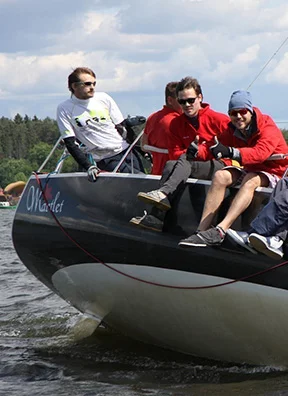
Bareboat Skipper
Recreational sailing yacht skipper of vessels up to 78 feet
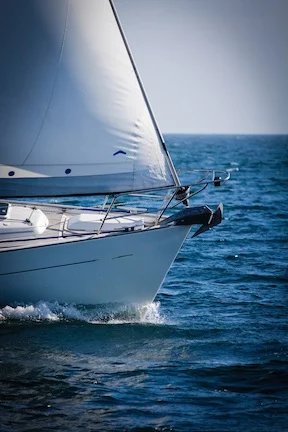
Issued documents
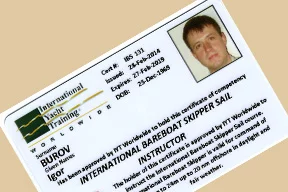
10 days live aboard course on power or sailing yacht. The key objective of the course is to teach candidates to become a recreational sailing yacht skipper and be able to charter and handle big cruising yachts on their own.
Ideal for those who already have little sailing experience and would like to learn coastal navigation.
- navigation at sea
- collision regulations
- practice at sea 200nm
- Skipper on a yacht up to 78ft. / 24m
- 20 miles offshore in day time
- in moderate weather conditions

5-day sailing course on board of a cruising yacht. The main objective of the course is to teach basic sailing terminology, parts and functions, basic sail trim, helm commands, seamanship and safety.
Ideal for candidates with little to no previous sailing experience who wish to train to become an active crew member on a power or sailing yacht.
- no special requirements
- Crew on a yacht up to 78ft. / 24m
- in sight of land and in fair weather
- only with professional skipper
Choose your sailing program. Where to start?
Introduction to sailing, on the coast.
Sailing knots - 3 hours
Understanding of the boat - 3 hours
On the water
Basic keelboat - 3 hours
Basic cruising
Safety on board - 3 hours
Live aboard sailing boat - 5 days
Live aboard power boat - 7 days
Bareboat cruising
Mandatory shore-based course for navigation and collision regulations at sea
Passage planning
Collision regulations
Practice at sea
Sailing boat - 10 days
Motor boat - 7 days
Advanced coastal cruising
Take additional shore-based courses prior to practice at sea
Long-term passage planning
Tidal navigation
Night sailing
Celestial navigation
Live-aboard course in tidal waters
Sailing yacht - 7 days
Upcoming courses
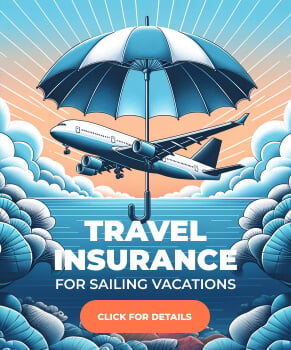
Blue water sailing practice
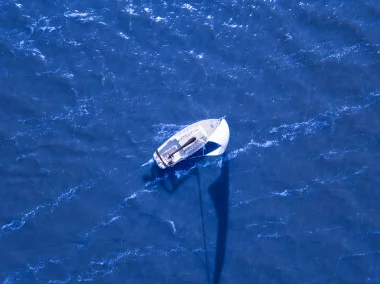
from ₽18,630
Availability
Competent crew
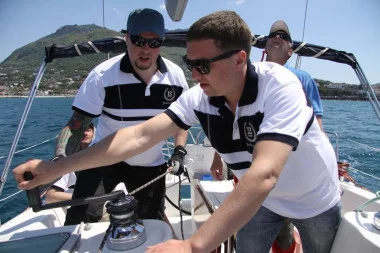
from ₽10,890
Marine weather forecasting

from ₽1,350
Motor Boat Charters Moscow Canal. Motor Yacht Charter Moscow Canal
Top-rated yacht charters in moscow canal - preselected yacht rentals:.

Yacht Elegance 64 for rent in Khimki Marina
- Elegance 64 [Yacht Price incl. Taxes]
- Dinghy with engine
- Skipper (food not included)
- Fuel consumption
- Yacht Insurance
- Final cleaning
- Tourist tax

Motor yacht Ambassador 26 for charter in Dolgoprudny Marina
- Ambassador 26 [Yacht Price incl. Taxes]
Using this site requires JavaScript. You are either using a browser that does not support JavaScript or has JavaScript disabled. Please click here for detailed information.

IMAGES
VIDEO
COMMENTS
But the $40 million sailing yacht sank within minutes and with fatal results: seven dead, including the British technology billionaire Michael Lynch, his teenage daughter, four of Mr. Lynch's ...
Chief prosecutor Ambrogio Cartosio said his team would work to determine whether the captain, other crew members, or the yacht's manufacturers bear any responsibility for the sinking. More from ...
The extreme winds could have caught the mast and pushed the yacht over, he said. Karsten Borner, captain of a nearby boat, said after the storm had passed, the crew noticed the yacht that had been ...
The 183-foot yacht sank to a depth of more than 160 feet. The bodies of Lynch and five other victims, including his 18-year-old daughter, Hannah, were found days later inside the yacht.
The captain of Mike Lynch's yacht flew out of Palermo on Thursday, 10 days after the British tech tycoon and six other people were killed when the vessel sank off the coast of Sicily.
The following notable deaths occurred in 2024. Names are reported under the date of death, in alphabetical order. A typical entry reports information in the following sequence:
Yachts available are Moorings 4500L sailing catamaran or the Moorings 5000 sailing catamaran in BVI. Price includes the yacht, skipper hire, skipper's food and drink, and complementary Wi-Fi. Find out more what's included here. Visit our FAQs page to find out more about skippered charters. Book through the skippered option on the BVI page ...
Do's and Don'ts for Skipper on Board the Yacht. As mentioned above, the primary role of the skipper on board the boat is to ensure a safe and enjoyable trip for everyone. This means taking care of the technical aspects of sailing, including the correct deployment of mast and sails, safe moorings, checking the weather conditions, guiding the ...
Welcome to theyachtskipper.com - the home of Your Yacht Skipper. We are here to help you turn your sailing dreams into reality - through coaching, charter, delivery or yacht skipper placement. Have a look at our services and contact us to find out more. Your Yacht Skipper can help you if
Yacht Charter with a Skipper or (Yacht Hire with a skipper) is a type of charter, Yacht Charter with a Skipper, is surprisingly popular (and increasingly so), easy, and highly recommended. They will know how to get the best out of your boat, they will be experts on the sailing and cruising area, and the best will be great company (or unobtrusive 'reading the room' or better reading the 'saloon ...
A good skipper will prevent boredom and apathy by agreeing daily routine maintenance tasks and helping to develop projects that improve the yacht and teach useful skills on board. A good skipper ...
The skipper will stay on board the yacht throughout the entire duration of your sailing vacation and assumes responsibility for the safety, operation, and navigation of the yacht. With years of boating experience and a wealth of local knowledge, your skipper will be also an indispensable guide to all the great attractions in your cruising area. ...
For our skippered charters, you are hiring a professional skipper to do the sailing for you, leaving you and your guests to enjoy a relaxing, hassle-free vacation. It is also known as a captain only charter. You do not need sailing experience to hire a yacht with our skippered charters. It is easier to book and more affordable than you think.
A sailing yacht charter with the option of a Moorings skipper is an excellent choice if you have never chartered before, want to book a yacht that's larger than you're comfortable handling, or simply want more time for rest and relaxation. You can still charter the yacht of your dreams — with a little help.
The skipper will stay on board the yacht throughout the entire duration of your sailing holiday. The skipper provides added security and comfort for new sailors or beginners who aren't quite ready to take a yacht out or don't have the qualifications to do so. Experienced sailors may also hire a skipper to take advantage of the local ...
Yachts available are Moorings 4500L sailing catamaran or the Moorings 5000 sailing catamaran in BVI. Price includes the yacht, skipper hire, skipper's food and drink, and complementary Wi-Fi. Find out more what's included here. Visit our FAQs page to find out more about skippered charter. Book through the skippered option on the BVI page ...
The term "skipper" holds a prominent place in the world of boating and sailing, representing the individual tasked with the operation, navigation, and overall management of a vessel.Whether it's a small boat, a luxurious yacht, or a sailing dinghy, the skipper plays a crucial role in ensuring the safety and smooth functioning of the maritime journey.
You will need to cover the cost of the boat, together with mooring and fuel, and then decide whether to include food, meals out, and drinks. I find that the simplest option is to share all the costs equally, and the first step is to prepare a rough budget so people have an idea of how much the trip is going to cost.
A coastal skipper is a yachtsman or woman who has the ability to skipper a yacht in coastal waters by day or night. There is a shore-based course which provides the background knowledge required, a practical course which teaches the skills and techniques required, and a Certificate of Competence. While the qualification originated in the United Kingdom, the course is taught worldwide.
Skipper is more used for smaller yachts without additional crew. A skipper is typically in charge of smaller boats, such as pleasure crafts, or small commercial boats, that may not require numerous crew. They are often responsible for their own safety and that of their passengers, as well as sailing. The responsibilities of a skipper
The yacht skipper. Sometimes, the boat owner assumes this pivotal role, while others may opt for hiring a professional crew. In this article, we'll journey through the multifaceted role of a skipper, exploring the breadth of their responsibilities from navigation to guest relations. We'll guide you through the avenues available to find the ...
Choosing a yacht delivery company and skipper. In general, it'll be the company that selects a skipper, so you need to pick the company you most feel happy with. They'll forward you, the owner, the candidate skipper's sailing CV. Naturally, you'll be given the right of refusal. Peter Kloezeman, PYD's operations director, says they ...
5 days, 100 miles, 4 night hours on board a sailing yacht. Theory to the level of Day Skipper. Whilst it is recommended you attend a Day Skipper shore-based course beforehand, which includes an exam, you just need to be confident in doing the theory to the required level, as there isn't time to learn this on the course.
Yacht Charter Skippers: Greg Allen - St Vincent Skipper. The sea has been Greg's passion for all his life and consequently, his chosen career. He is extremely well qualified with his RYA Commercially Endorsed Yachtmaster and is very experienced. Greg has worked on dive boats, as the captain of a large private yacht, and as the owner/skipper ...
Yacht chartering is the practice of renting, or chartering, a sailboat or motor yacht and traveling to various coastal or island destinations.. There are three main kinds of charter: bareboat, skippered and crewed. Bareboat charters require the client to skipper the boat themselves, while skippered charters include both boat and a professional skipper. . Crewed charters are staffed by a ...
Recreational sailing yacht skipper of vessels up to 78 feet. Issued documents Bareboat Skipper 10 days live aboard course on power or sailing yacht. The key objective of the course is to teach candidates to become a recreational sailing yacht skipper and be able to charter and handle big cruising yachts on their own.
Yacht Charter Russia ⛵ Bareboat Charters & Crewed Yacht Rentals in Russia ★ Rent a Yacht in Russia Charter Boats & Charter Yachts in Russia Skippered Yacht Charter, Crewed Yacht Rentals or Bareboat Charter in Russia READY TO BOOK! ... You are able to charter and drive this boat yourself. A skipper can be booked as an additional extra if ...
Yacht Charter Moscow Canal ⛵ 4 Bareboat Charters & Crewed Yacht Rentals in Moscow Canal ★ Rent a Yacht in Moscow Canal Charter Boats & Charter Yachts in Moscow Canal Skippered Yacht Charter, Crewed Yacht Rentals or Bareboat Charter in Moscow Canal READY TO BOOK!
2 Motor Boat Charters and Rentals in Moscow Canal available. Hire Motoryachts with captain/skipper only or charter crewed yachts in Moscow Canal. Speedboats, power boats or luxury motor yachts READY TO BOOK ONLINE!